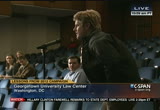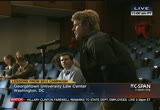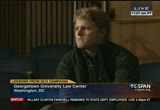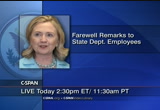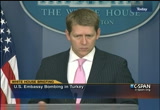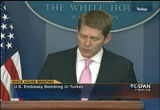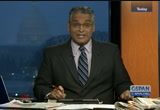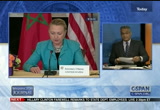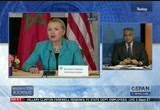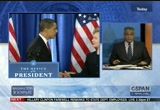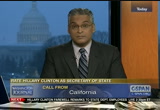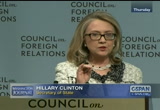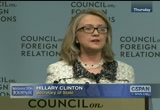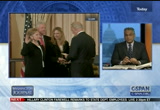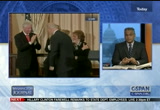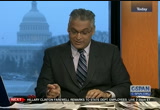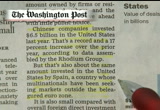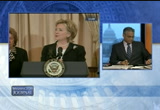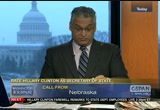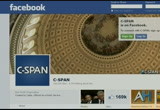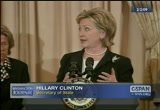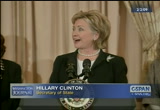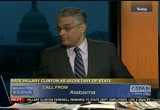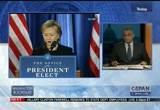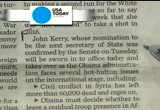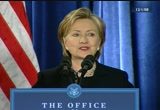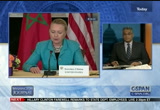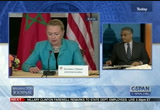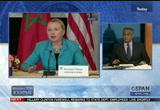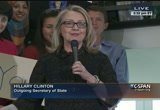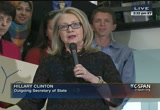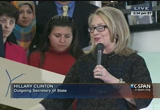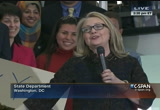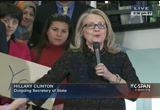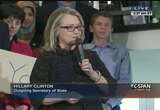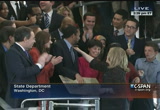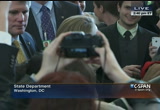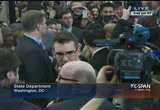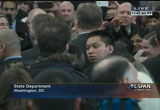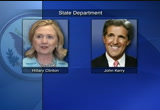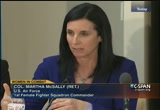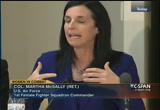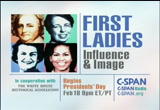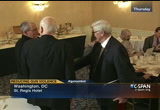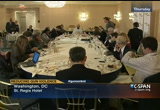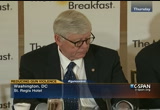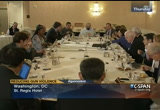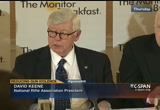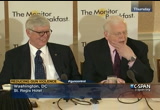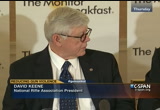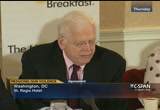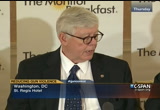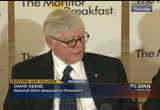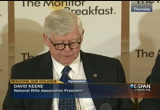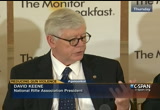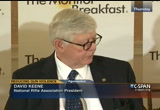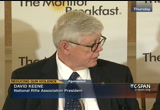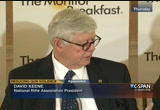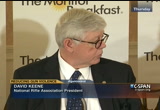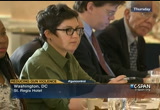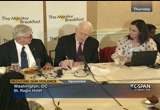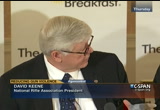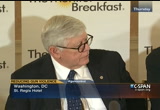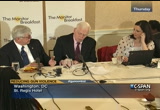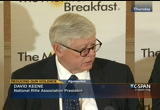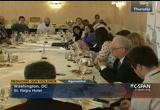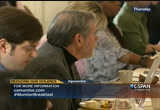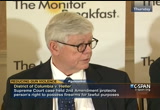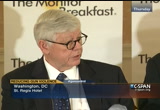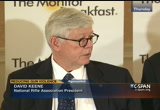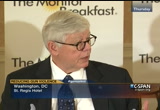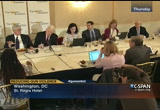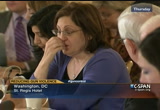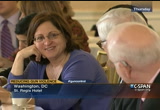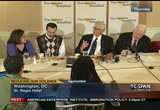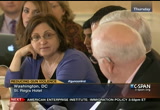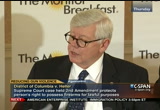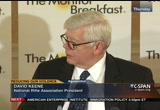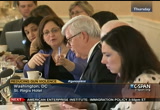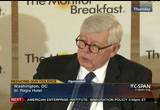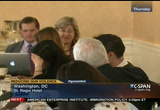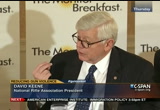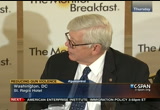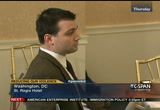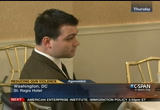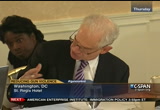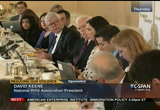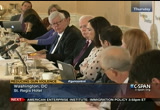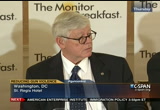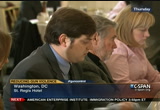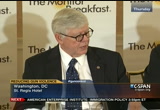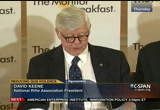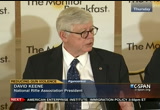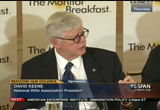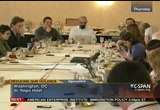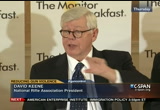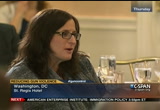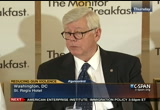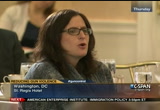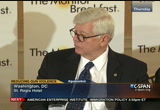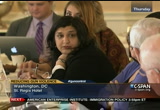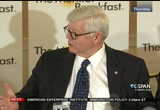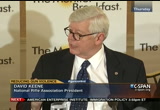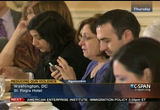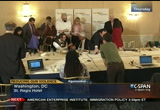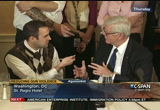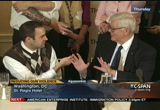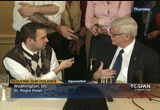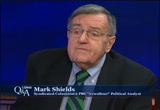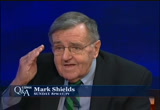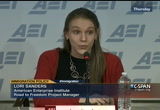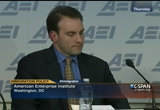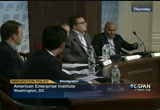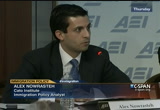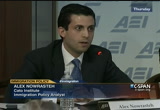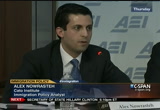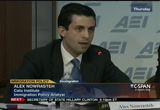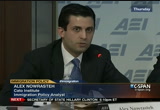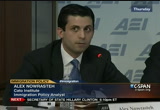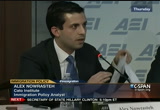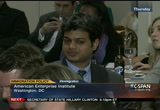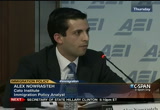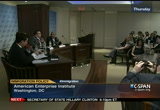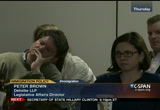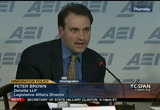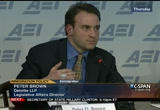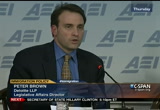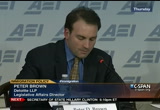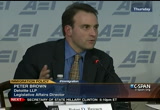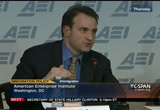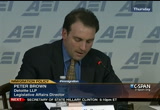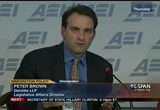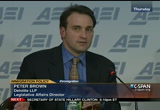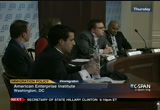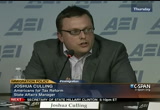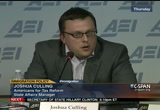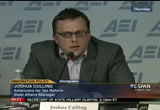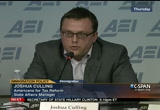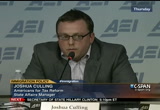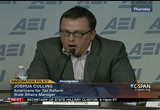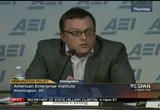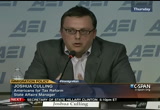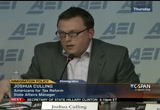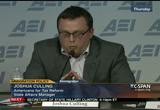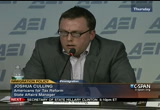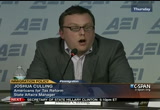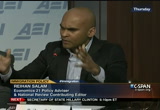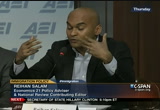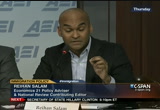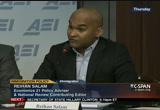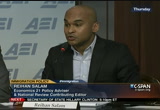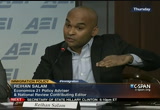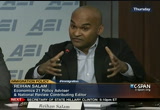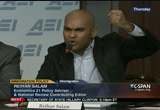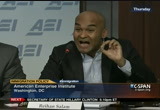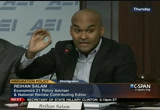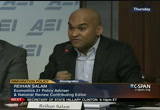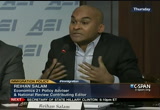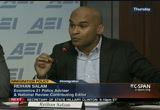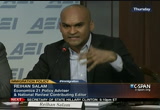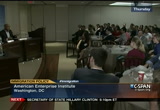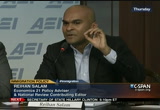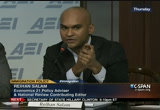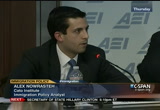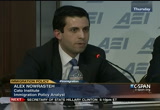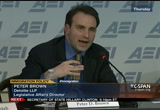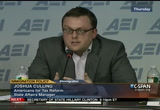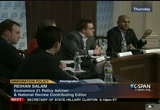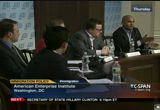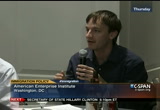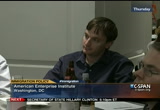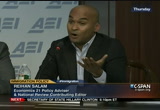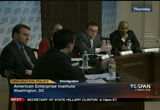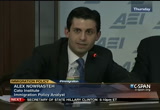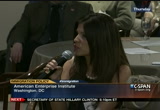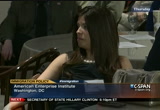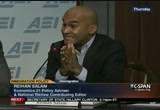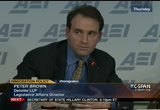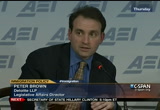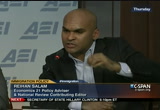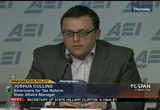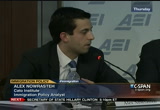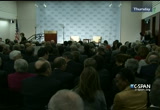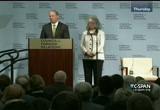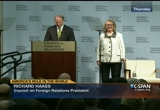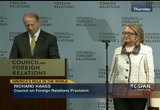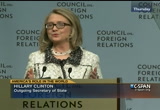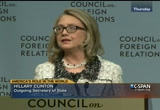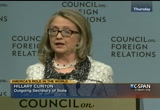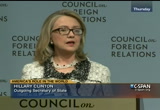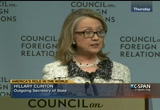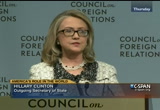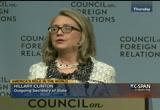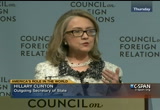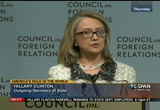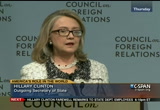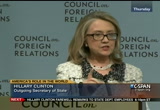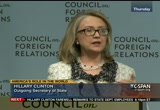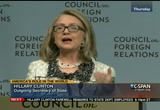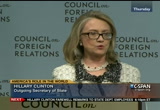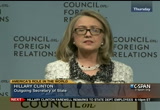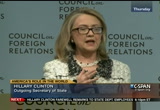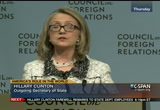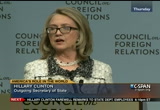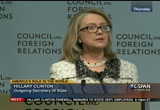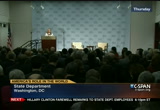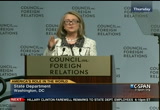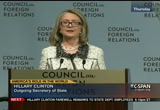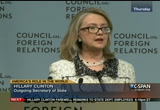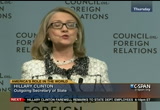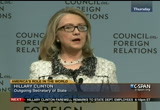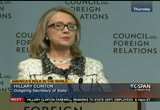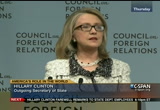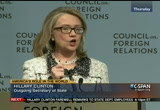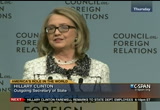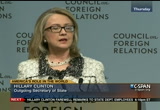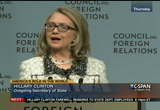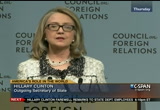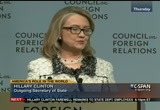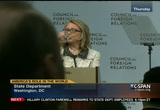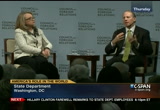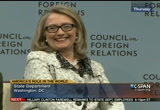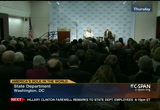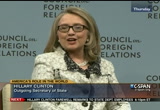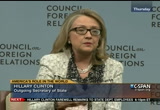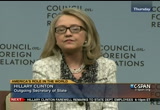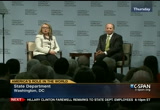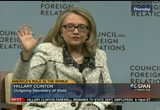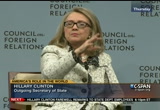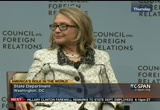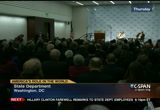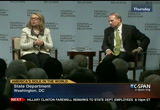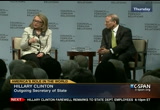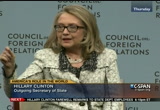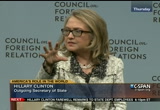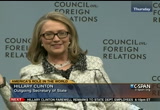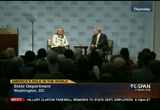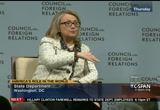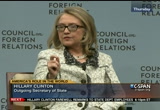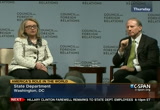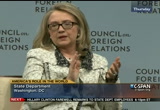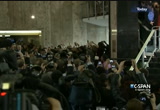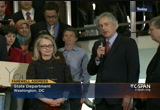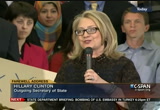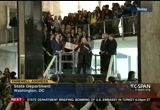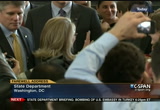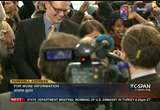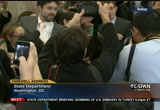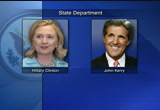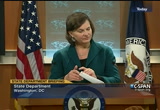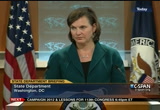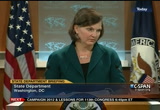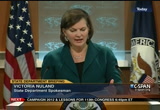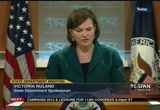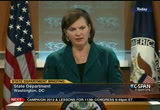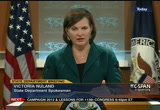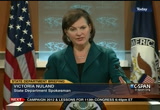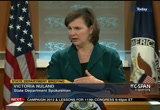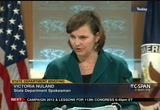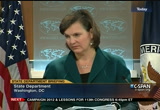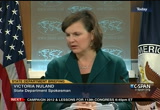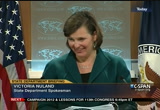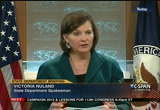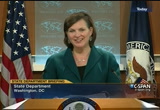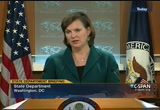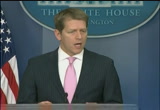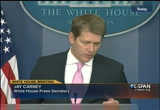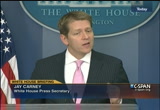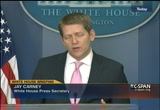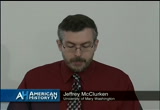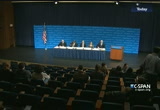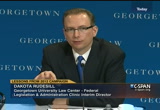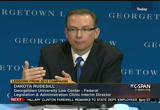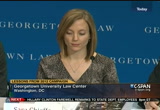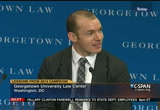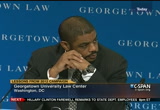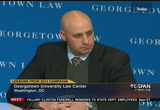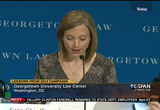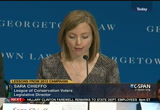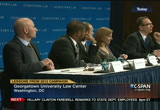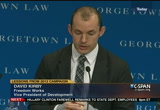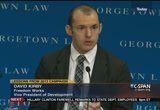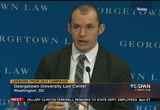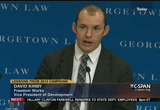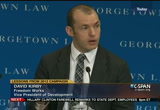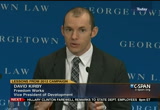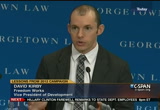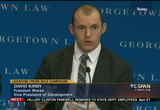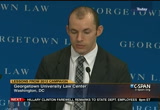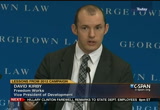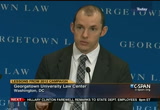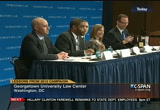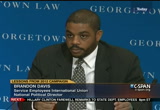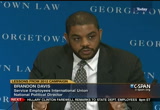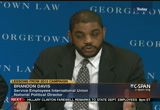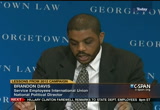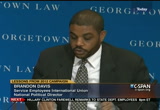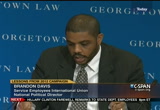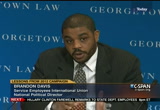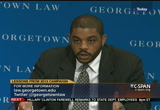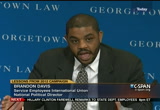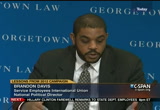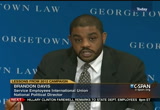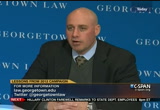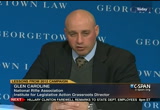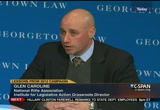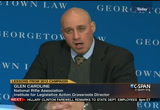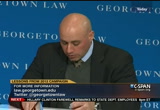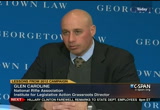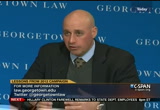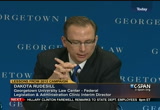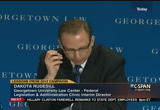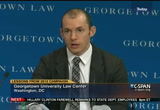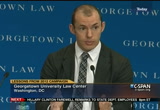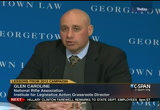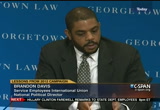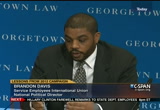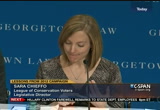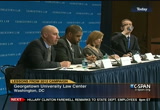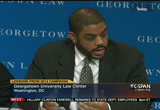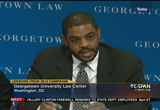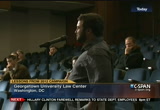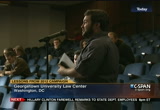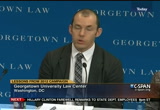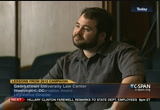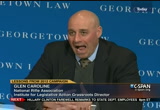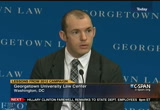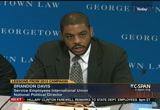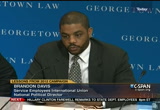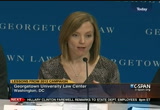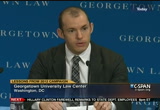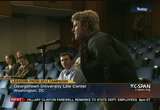tv Politics Public Policy Today CSPAN February 1, 2013 2:00pm-8:00pm EST
2:00 pm
so a follow up on the last question. it's interesting to see both sides really embrace the grassroots going forward to win campaigns but to advance legislation. one of the things i'm curious about one of the things i'm curious about is that you can only by the grassroots to a certain degree. it applies to even the new manifestation of ofa going forward -- when you are raising large amounts of money from entities that are not the grass roots and don't have the same objectives going forward as the grassroots. to what degree, particularly with the gun legislation in a year or two, do we end up in environment where some legislation passes that is popular not only politically but with a large part of the nra membership -- at what point do you see organizations actually changing their political
2:01 pm
outlooks and prerogatives that reflects -- a way that reflects more the grass roots and not so much the gun manufacturers or big industries or the manufacturers? >> first, i reject the claim that there is any gun-control legislation that will be passed the will be popular among our supporters. what it will do is energize our base. our base is extremely focused on what is going on in congress. they are extremely passionate and have a lot of energy. they will generate a higher level of interest in the 2014 elections, and we will able to capture that energy and spirit accordingly in the elections -- steer it accordingly in the elections. >> terrific. well, we have reached the end of our time, so i asked you to join me in thanking our panel -- sara chieffo, david kirby, brandon
2:02 pm
davis, and glen caroline. [applause] [captioning performed by national captioning institute] [captions copyright national cable satellite corp. 2013] + >> coming out in about 30 minutes, we will take you live to the state department, where outgoing secretary hillary clinton will deliver remarks on for employees. she officially steps down today. senator john kerry of
2:03 pm
massachusetts was confirmed by the senate on tuesday to be her replacement. he is expected to be sworn in the day by the supreme court justice sonia sotomayor. in the meantime, we will have live coverage of the secretary clinton's earmarks around at 2:30 p.m. eastern on c-span. president obama will honor the recipients of the national medal of science and national medal of technology and innovation, the highest honors bestowed by the u.s. government upon scientists, engineers, and inventors. you will have it for you later in our program schedule. at the white house, jay carney held his daily briefing, addressing a number of issues including a bombing at the u.s. embassy in turkey today. >> does the president considered the attack on our embassy in turkey to be a terrorist attack? >> that is an excellent question a suicide bombing on the perimeter of an embassy is by definition an act of terror,
2:04 pm
a terrorist attack. i think this is an incident that has just occurred and i don't want to get ahead of it, is being investigated. we strongly condemn what was a suicide attack against our embassy in ankara, which took place at the embassy's our security perimeter. details are still emerging about what exactly happened, who was responsible. it is clearly an act of terror. it caused -- cost hte life about least one individual, a turkish security guard. we are working with the turkish authorities to investigate the incident and bring the perpetrators to justice. our thoughts and prayers go out to the families of those killed and injured, and we greatly appreciate the support we've received from turkish fans and responding to this terrible tragedy. turkome turkey -- remains one of our strongest allies in the
2:05 pm
region. we've worked shoulder to shoulder with the turks to counter terrorist threats, and this will only strengthen our resolve. the turkish have been a very important ally broadly speaking in the effort to counter terrorism. >> you can see the entire white house briefing on our website, c-span.org. as we told you earlier, we have outgoing secretary of state clinton's remarks at the state department at 2:30 p.m. eastern. until then, today's "washington journal," will ask viewers about secretary clinton's legacy.
2:06 pm
2:07 pm
you want to join us, the phone numbers will be on your screen. indiana, on our independent mind, rob. good morning. caller: good morning. how are you today? host: fine, thank you. what do you think of this sectarian state's performance? caller: a good job. one of the best we have ever had. host: what gives you that impression and what can you point to? caller: [indiscernible] during the bush administration -- host: i'm sorry, go ahead. caller: can you hear me? our country is more respected now that it was four years ago. i think she is very good in
2:08 pm
foreign policy and i think she will be -- i think this will help her in 2016. host: we go next to jeff in tupelo, mississippi. republican line. caller: good morning. how are you? host: fine, thank you. caller: she got sworn in, she looked good in the pictures, she flew around the world a little bit, and nothing that she has accomplished. i don't think our allies are real pleased with. our enemies in the past belief in the best predictor of -- i mean, future behavior is past behavior. the only thing that the real bad people in this world understand is force. i don't think talking to them and making nice-nice with them
2:09 pm
is going to do anything except emboldened them. host: you made a statement about our allies and their perception? could you expand on that? caller: well, the lead from behind strategy of this administration got two diplomats killed and three brave americans killed in libya. as far as her taking responsibility for that, what responsibility is it that she has actually taken? none she actually said to the american people what difference does it make now for that information to be dispensed to the public. host: you can go to c-span.org to watch those hearings for yourself. on twitter --
2:10 pm
a little bit of background, or at least overall background of what she did during her time as far as major accomplishments -- she traveled to 100 of countries, according to "businessweek," 975,000 miles logged, and her first trip was in february 2009 to japan, south korea. her 79th trip was december of last year to the czech republic, belgium, ireland, and northern ireland. stella on our democrats' line, asking you to raided the secretary of state's performance. caller: i would give her a 10. she is a fabulous woman representative of the united states. as far as 9/11, bush and cheney should take responsibility. host: what are the highlights
2:11 pm
for secretary clinton in your mind? caller: just the weight she has represented women and looked out for women. she is awesome. host: women's programs is something she spoke about at the council on foreign relations. if you want to see that on our website, c-span.org -- the video library is the place to go. in this portion of the speech, she talked about smart power in a world where she says the levels of influence are changing rapidly. [video clip] >> simply put, we have to be smart about how we use our power, not because we have less of it. the might of our military, the size of our economy, the influence of our diplomacy, and the creative energy of our people remains unrifle. no, it is because as the world has changed, so, too, have the levers of power that can most effectively shape international affairs. i have come to think of it like
2:12 pm
this -- truman and acheson were building the parthenon with classical geometry unclear lines. the colors were a handful of big institutions and alliances dominated by major powers, and that structure delivered unprecedented peace and prosperity. but time takes a toll even on the greatest benefits -- edifice, and we do need a new architecture for a new world. more frank gehry than formal greek. [laughter] think of it. some of his work might appear at first haphazard, but it is highly intentional and sophisticated. where once a few strong columns could hold up the weight of the world, today we need a dynamic mixture of materials and structures. american military and economic strength will remain the
2:13 pm
foundation of our global leadership, as we saw from the intervention to stop a massacre in libya, to the rates that brought bin laden to justice, there will always be times when it is necessary and just to use force. host: again, that is the secretary of state, who spoke at the council on foreign relations yesterday. texas. .ames, go ahead caller: i would like to give her a zero, because i think she is personally responsible for the deaths of the americans in benghazi. i watched on your c-span showed her answers to questions, and her answer is that she did not read these faxes or what ever else coming out of benghazi for security. because she gets -- i forget the number, 200,000 a year, and it is impossible to read the street you can have emergency faxes and
2:14 pm
hire a couple of people to read these faxes. they are coming from americans and a war zone. you did not read them so you did not know they needed more security? if you did not read them, you are not doing your job, honey -- host: republican line. caller: i would give her an f. the media mixes up the view that the obama administration wants to get rid of -- fox and talk radio. she has put over a million miles said she has become secretary of state, says "i am proud of her as a woman." what, she stuck with clinton with the college intern and cigars and a thing else, and she would be the worst
2:15 pm
president -- i never thought we would have worse than this one -- host: according to the f, what led to your f rating? ok, he is gone. democrats' line. caller: i would give her an a. she was the president, pretty much. she was constantly on the road. i want to say something about the hagel confirmation -- guesthost: which we will talk about at 8:30, just so you know. caller: people have got to understand -- host: if you want to join us at 8:30 to talk about the hagel confirmation, you are more than welcome to do that. "washington post" -- "iran to in
2:16 pm
which more uranium." "it is believed to be vastly superior to the clunky 1970's- era ir1 machine that iraq releases, giving iran the ability to produce up to four times as much enriched uranium per machine. iran claims the enriched uranium would it be used exclusively for nuclear power plants, but officials suspect that iran is using nuclear energy for weapons programs." this from "the post," the headline is specifically looking at china. "chinese companies invested $6.5 billion in the united states last year. that's a record, and a 17% increase over the prior year. but that's also about the same amount invested in the united states by spain." secretary of state hillary clinton and her performance over
2:17 pm
the last four years. giving you an opportunity to assess how she did in the position. lawrence in st. paul, an abandoned line. caller -- independent line. caller: i think she has done an admirable job to i would not assess how well she did based on how many miles to travel. but here is what bothers me -- the cheerleading think versus effectiveness. i am not saying she wasn't effective, but i think that condoleezza rice was one of the most idynamic individuals to evr serve. she was admirable to me. she was great. she is articulate, very well educated, did some wonderful things, knew how to handle the power of male egos. but the press would not give her the same accolades, the general media would not give for this
2:18 pm
and accolades, not because she was competent, but because of her political ideology. there is some dispute bi -- skewed bias rating hillary clinton for some of the wrong things. host: on twitter -- "the washington post" adds this as far as analysis of her time in office -- "many of clinton's successes appeared to be due largely to her personal popularity and famous work ethics, attributes that were on display in her final days in office." nevada. caller: i would like to make a few comments about hillary clinton. i think the only reason she ever had her job was because of her husband, bill. she did exactly what she has been told to do by the president's, and a lot of us are
2:19 pm
not on tune with president obama's schedule, especially this benghazi deal. whenever a person throws her hands up in the air and is not want to admit to any responsibility of a job done poorly that killed some of our americans -- i am not happy with her performance. she is just a member of president obama and bill clinton -- mirror of president obama and bill clinton. host: on twitter -- he goes on to make other comments. even make comments on facebook. facebook.com/cspan is how you do so. let's give some history. this is from her 2009 swearing in.
2:20 pm
[video clip] when i came into this building for the first time all week or so ago now, i told the assembled state department employees and i repeated again at u.s. aid, that we are all on the same team, and it is america's team, and we have with the leadership of president obama someone who wants us to reach out for the world, to do so without illusions, understanding that the difficulties we face will not be wished away, but meeting them forthrightly and smartly, and that we want to seize the opportunities that exist as well. i talked in my confirmation hearings about smart power. well, smart power relies on smart people, and we have an abundance of them in this building and at usaid. but i have also pulled my teammates in the state family
2:21 pm
that we will have to be smarter about how we do what we must for our country. there are many ways we can improve what we do on a daily basis, and i want to work with my friends in congress on behalf of our administration to really look for those efficiencies and those changes that will make what we do more effective, more cost-effective, so that we can be out there around the world delivering america's message. certainly doing all we must to protect and defend our security, but also advancing our interests and furthering our values. for me this has been an amazing personal journey. as joe laughingly referenced, neither one of us thought -- [laughter] that we would be standing here together doing what we are now doing together. life has a funny way of
2:22 pm
unfolding, and politics is even stranger. host: that is hillary clinton from 2009. this is the associated press story concerning an event that took place moments before the start of this program in turkey, saying that "a suicide bomber has detonated an explosive device at the entrance of the u.s. embassy in the turkish capital, and at least two people are dead. an associated press journalists on friday saw body in the street in front of an embassy side entrance. the bomb appeared to have exploded inside the security checkpoint. ntv television said two security guards were killed. phones were not being answered at the embassy." democrats' line. caller: good morning. thank you for taking my call. i think hilary did an awesome job. i would give her at least a 9.
2:23 pm
had a daunting task ahead of her when she was confirmed, because this country did not look good to our allies and the rest of the world, after the debacle that we went through with the former administration. she hit there road running, and thanks to her, we got back a lot of support that we needed, especially in these trying times ahead of us with iran. we needed to gain a lot of that support back. host: is it about hillary clinton's role in that position that helped that along, in your opinion? caller: during the clinton administration, she was an ambassador anyway, and the leaders of the world out there just had a lot of faith in her and her husband's
2:24 pm
administration, and she had a lot of convincing to do that the united states could get through these hard times, and things are going to change, and it looks like she has done an outstanding job, because we certainly have a lot of support back now and confidence that we did not have. host: next up is lafayette, louisiana. peggy, republican line. caller: thanks for taking my call. as a woman to another woman, i think she failed women in the united states. i have so much to say about the crime against women in this country, especially a woman that lives alone. there is no advocate program in the united states of america. she had the ability, the power to get so many great programs done in our country, and she failed. i don't see how the previous caller could say that she has restored respect in our country to other countries.
2:25 pm
that is phenomenal. what a statement. so anyway, that is what i have to say. there are so many avenues that this country, our country, the united states of america, has failed american women, the elderly women that live alone, even the men that live alone. we have no programs that we advocate for them, and that is my statement. thank you so much for taking my call. host: in the "usa today" write up of the speech she made to the council on foreign relations, there was a little bit on the body language of the speech. they talk about john kerry as he assumes the position today, will be sworn in today. "john kerry, whose nomination to be the next secretary of state was confirmed by the senate on tuesday, will be sworn in to office today and takes over as the obama administration faces several hot-button issues,
2:26 pm
including civil conflict in syria, the president must decide whether to leave residual troop presence in afghanistan beyond 2014, al qaeda-linked groups and africa are a growing threat." some of the analysis being done with the outgoing secretary of state and now with the john kerry coming into the position. it is the outgoing secretary of state we talking about for the remainder of our time, 20 minutes or so. ohio, independent line. hi, mark. caller: thank you for c-span. i would give her a 10. she is one of those kinds of people that no matter what job he is given, she is going to do an excellent job. all the people attacking her -- benghazi? what about iraq. give me a break who cut the funds for benghazi? the republicans? the republican neocons needed to .lay down and go away
2:27 pm
host: what are her accomplishments? caller: whatever job she is given she does an excellent job. it does not matter that she is a democrat, any of that. she is a hardworking person, hard-working lady, and she made those 10 or 21 years who tore down a look at, because she is smarter than all of them put together. host: michael, democrats' line. caller: she has learned a valuable lesson. president obama is the master of all presidents for tweeting, and here is his hot line. has a nice young black girl working for him, and he makes sure that social security does not get, listens to the entire calls coming in while he manages this entire country we have men and women who are guilty of not hearing the secretary when the
2:28 pm
call comes in, where the people in working in office never replace a message to him. that cost hillary clinton at her future nomination as president of the united states. she has learned a valuable lesson. but women alone are not guilty of that. there are many men in office and never hear a word coming in. they are making money but they never find out what is coming in to the fax machine, and that one black woman, hillary clinton had a beautiful chance to do a lot of things and it the united states. once they get to the top and they lose their head and do everything for the rich and nothing for the common people. host: josh in north carolina, republican line. caller: contrary to the second to last caller, i am not going to lay down and go away, but i will give an accurate and fair
2:29 pm
assessment of the secretary of state in a comparative way. i would give hillary clinton a c, an average rating as secretary of state, and maybe because of the way the world stage as played out during her tenure. my f is reserved for people like madeleine albright, who, during the rwandan genocide, along with bill clinton, refused to call it that, refused to call it a genocide, and turned it the other way. during the kosovo operation, as we have seen with comments recently from madeleine albright, she has a pretty great antipathy towards the serbs. i think the secretary of state needs to be an international scholar. if you look at condoleezza rice, henry kissinger -- >> we will leave it is not to take you to the state department for farewell remarks from -- need this now to take to the state department for farewell
2:30 pm
remarks from secretary clinton. she officially steps down from office today. [cheers and applause] >> good afternoon, everyone. madam secretary, up four years ago, i stood on this same spot and had the honor of introducing you to the men and women of the department of state. from that first day on, you have touched the lives of millions and millions of people around the world, you have left a profoundly positive mark on american foreign policy, and you have done enormous but for all of us and for the country we served. we will miss you deeply, but none of us --
2:31 pm
[applause] but none of us will ever forget your extraordinary leadership, and each of us will always be deeply proud to say that we served in hillary clinton's state department. [cheers and applause] great hnor tos my introduce one last time, the 67 the secretary of state of the united states for america, hillary rodham clinton. [cheers and applause] >> oh. thank you. thank you.
2:32 pm
oh. well, just, all of you, the people i have been honored to serve and lead and work with over the last four years, is an incredible experience. when i came in to this building as secretary of state four years ago, and received such a warm welcome, i knew there was something really special about this place, and that having the honor to lead at the state department and u.s. aid -- usaid would be unique and singular, exciting and challenging. it has been all of those things and so much more. i cannot fully express how grateful i am to those with
2:33 pm
homwhom i have spent many hours here in washington, around the world, and in airplanes. [laughter] but i am proud of the work we have done to elevate diplomacy and development, to serve the nation we all love, to understand the challenges, the threats, and the opportunities that the united states faces, and to work with all our heart and all our might to make sure that america is secure, that our interests and our values are respected. as i look back over these past four years, i am very proud of the work we have done together. of course, we live in very
2:34 pm
complex and even dangerous times, as we saw again just today at our embassy in ankara, where we were attack and lost one of our foreign service nationals and others injured. but i spoke with the ambassador and the team at there, spoke with my turkish counterpart, and i told them how much we've valued the commitment and their sacrifice. i know that the world we are trying to help bring into being in the 21st century will have many difficult days. but i am more optimistic today
2:35 pm
than i was when i stood here four years ago, because i have seen a day after day the many contributions that our diplomats and development experts are making to help ensure that this century provides the kind of peace, progress, and prosperity that not just the united states, especially young people so richly deserve. i am very proud to have been secretary of state. i will miss you, i will probably be dialing ops just to talk. [laughter] i will wonder what you all are doing, because i know that because of your efforts day after day, we are making a real
2:36 pm
difference. but i lead in this department confident, confident about the direction we have sat, confident that the process of the qddr, which for the first time has enabled us to ask hard questions about what we do, how we do it, whether we can do it even better, because this date and -- state and aid always have to be learning organizations. we owe it to ourselves, we owe it to the president, we away to the american people. and so i will be an advocate from outside for the work that you continue to do here and at aid. so it has been quite challenging week saying goodbye to so many people, and -- and knowing that i will not
2:37 pm
have the opportunity to continue to be a part of this amazing team. but i am so grateful that we have had a chance to contribute in each of our ways, making our country and our world stronger, safer, fairer, and better. those of you who are staying, as many of you will, please know that i hope that he will redouble your efforts to do all that you can to demonstrate unit quickly why -- unequivocally why diplomacy is right up there with the defense. it is because we are united and committed to do whatever is required to fulfill the
2:38 pm
missions we have assumed as public officials and public servants. so next week, i would expect that all of you will be as focused and dedicated for secretary kerry as you have been for me, and that you will continue to serve president obama and our nation with the same level of professionalism and commitment that i have seen firsthand. on a personal basis, let me wish all of you the very best, whether you have been here all week, or 30, or even 40 years, pat. [laughter] let me give you the very best wishes that i can, because i am
2:39 pm
proud to have been a part of you. i'll be thinking of the nearly 70,000 people thought -- i leave it thinking of the nearly 70,000 people that i was honored to serve and leave as part of a huge extended family, and i hope that you will continue to make yourselves, make me, and make our country proud. thank you all, and god bless you. [cheers and applause] [captioning performed by national captioning institute] [captions copyright national cable satellite corp. 2013]
2:44 pm
>> hillary rodham clinton wrapping up four years as secretary of state, as the associated press reports that the letter said on friday before she was to leave in her official capacity, secretary clinton thanked her former opponent in the democratic presidential nomination for the opportunity to serve in his administration. she said it had been an honor to be and his cabinet and she remained convinced "of the strength and staying power of american global leadership."
2:45 pm
her resignation will be effective on the swearing-in offer a success -- her successor. a discussion on women in combat where women who served in iraq and afghanistan to talk about their experience and commented on the pentagon lifting of the ban on women in the front lines of combat. one of the speakers was the first female pilot to fly in combat. here's a little of what she had to say. >> sitting in a squatter officer school, i was getting ready to go to fighter training, i just completed the triathlon, a bunch of injured 3, special forces, i take to their -- kicked their butts, and you had guys saying, "women don't have the endurance
2:46 pm
to do, admissions." you want to go outside and talk about this? [laughter] let's go for a run. the difficulty and the reason -- and seeing it even in the debates that are going on even though the train has left the station, a lot of people who are against this thing get away with you have been excluded from doing this, you have not done it, i have done it, therefore you cannot do it. i don't know if you have seen the nuances on tv lately. sure, you have been in combat and engaged with the enemy anbut that is the different from sustained operations. that is the language you are hearing, on fox, and it might. [laughter] -- fox, anyway. [laughter] justin bieber can do it but
2:47 pm
venus williams cannot? [laughter] seriously? >> that is part of an all-day event that is wrapping up this hour. you can watch it in its entirety on our website, c-span.org guest: >> abigail adams, wife of the nation posture first vice president and second president, john adams, and one of the women who served as first lady come in c-span's series "first lady's." produced with the white house historical association." c-span, c-span radio, c- span.org.
2:48 pm
2:50 pm
>> here we go. thank you for coming. our guest this morning is david keene, president of the national rifle association. he made several breakfast appearances during his long tour as president of the american conservative union. our guest has had a lifelong interest in politics. he is a graduate of the university of wisconsin law school. while there, he was chair of young americans for freedom. he ran unsuccessfully for the united states senate, and has worked as an operative for a who's-who of republican candidates. he was a political assistant to spiro agnew. he has had key roles in the presidential campaigns of ronald reagan, george h.w. bush, and robert dole. he has been a fellow at the kennedy center harvard institute of politics. so much for biography. now on to the exciting matters
2:51 pm
of process. we are on the record. no filing of any kind while the breakfast is underway. there is no embargo when the breakfast is underway except that c-span has agreed not to use video until after it the breakfast has ended. i tell guests that despite major changes in the news business, the breakfast group remains committed to conversations between newsmakers and journalists. your help is appreciated on mornings when guests are at the center of a controversial issue, as our guest is. on the front page of "the wall street journal" this morning, a lovely color picture. if you would like to ask a question, do the traditional thing and send me a subtle signal and i would do my best to call on one and all. i will give mr. keene the opportunity to make some comments.
2:52 pm
>> i will not spend a lot of time making a speech, because i would rather have a conversation and answer any questions and respond to any concerns that you might have. yesterday was the first hearing since newtown before the senate judiciary committee, and a number of witnesses there on both sides of the issue discussed the various approaches, presumably, to prevent future mass shootings and to deal with gun crime. our concern was a lot of the senators and some of the witnesses were more concerned with guns than with either gun crime or effective measures to deal with these things. there are a lot of areas in which we are perfectly prepared to work both with this administration and with congress where we think there should be some real improvement
2:53 pm
and some real opportunities to create a safer society, so we are encouraged by that. we continue to take the position as we always have that while we are not experts on a lot of things, we know a bit about firearms, about the second amendment, when a little bit about what works and what does not work in terms of crime, and we're not willing to support measures which we feel unduly burdens innocent and law- abiding americans, and on the other side do not have any real impact on the problems we're trying to solve. with that, why don't i throw it open to questions. >> that is the land speed record for opening remarks. >> i have learned that people who want to ask questions did not want to hear people talk. >> you are on the front page of today's "the wall street journal."
2:54 pm
what was your response to gabrielle giffords' plea for an additional gun curbs? >> she said something needs to be done, and i think we agree with that. it is not that there is a great number of these things that have happened, but if there are measures that need to be taken to deal with the sort of mass shootings that took place in newtown and gun crime, the steps should be taken. it was like the senator from connecticut at the statement from sandy hook, where everybody could agree with the statement, but the statement was very much like what former congressman giffords said, and that was that something ought to be done. those of us who sat there during that hearing and those who testified, we may disagree
2:55 pm
on what would be effective, what can be done within the context of the rights of innocent americans, but we all agree on the goal, and that is really what policy discussions should be about. they should be about how you solve a problem. people can disagree on what conditions work and do not work, but there is not a lot of disagreement with the fact the problems ought to be dealt with. [indiscernible] >> on yesterday's "morning joe," it was said the greatest danger to the second amendment was the policy that moves the republican so far away from mainstream america that they lose the house, the senate in 2014, and they lose the
2:56 pm
presidency. the theory was that a democratic president would nominate supreme court justices less amenable to gun rights. what is wrong with that assessment, that your strategy is not in step with the american people? >> i do not think the idea that the position of the national rifle association takes is wrong. we have about 4.5 million members, and the gallup polls that have been taken in recent years say that up to 40 million americans say they are members. beyond that, i used to say when i was talking the one thing i can say about the nra is we have a higher approval rating than either party. that is such a low bar that i do not say it any more. the approval rating of the nra is on par with the president.
2:57 pm
we have consistently and continued to speak not just for our 4.5 million members, but for gun owners and believers of the second amendment. the political influence if you will of the nra is not the result of our lobbyists and operations in washington. it is not the result of what i might say. it is the result of the fact that over the years we have represented people from both parties. a lot of our members are democrats, independents, small business people, housewives, and one think they have demonstrated over time is that when they perceive their rights to be threatened, they will vote. it will also contact their congressmen and senators. i think that is our role. we believe strongly in the second amendment rights of the american people. we think the suggestions that we
2:58 pm
have made, particularly the suggestions we have made on how to protect our children, resonate very well with the american people, and poll after poll and showed this, that the american people and the public recognize the need for security on the one hand and recognize that the problem is not the firearm, but because of this problem is that we in this country have managed to destroy a mental health care system of the last few decades that lets the kinds of people who should either receive treatment to coexist in a civil society or should be kept out of that society, because they are potentially dangerous to others, they need to be dealt with. almost all of these mass shooters, different from gun criminals, tend to be people who have severe mental problems. when i am not wearing my nra hat, one of the things i am involved with this criminal justice reform. in every single state in this country, not in some states, but in every single state there
2:59 pm
are more people in prison who have been diagnosed as severely mentally ill than there are in that state's private and public health care facilities. one thing we know is that prisons do not cure people who have severe mental problems. they get released on the street, as happened in new york, the shooting in new york where two firemen were killed by a man who had been in prison for hitting his mother-in-law in the head 80 times with a hammer, to kill her. before he was let out, he said the first thing he wanted to do was kill his sister. what kind of a system that does not deal with that or a woman in new york who was diagnosed as a schizophrenic -- what kind of a system is it that
3:00 pm
does not deal with something like that before, the situation where someone was pushed in front of a subway in queens. >> i agree that the mental health system does not serve us well. as you know, the pew polls show that 85% americans agree with closing the gun show loophole. gallup, 91%. aren't you out of step there? >> actually, i am surprised at some of the numbers in the wake of newtown, all of the publicity, all of the hand-rending. partly, when you get into this growing headlines around and charges, you get people to react to something that they have not really thought through. our position very early on, the nra is a strong supporter of the national instant check system.
3:01 pm
that is the database run by the fbi that when you go to purchase a firearm from a licensed dealer, you are immediately checked through these databases to see if you are on a list as a prohibited purchaser. the problem the system is that it needs to be fixed. it has got real problems. the president likes to say that some 2 million people have been prohibited from buying a firearm because of the system. 13 people have been prosecuted. the chairman of the judiciary committee said that we needed a lot to prevent straw purchases of firearms because it is no law. there is a federal law against strong purchasing and the making of false statements to buy a firearm for someone else that can result in a 10-year minimum sentence. that is on the books.
3:02 pm
in one year of some 76,000 people that were denied the purchase of a firearm, some 60 something were prosecuted and there was 13 convictions. 13 out of 76,000. if that is the case and these people were prohibited people, then why are they being prosecuted? if they did not get a firearm there, they get it somewhere else. you would think that if they could not get one there, they would go by in a privately or they would get it at a gun show. in fact, there has been surveys and criminals do not really buy guns at gun shows. if you have ever been to one, you are bumping into a uniformed police officer every five minutes. we have 300 million firearms in this country. when talking about what we're going to do, it may sound on examination, it is to be
3:03 pm
something else. we have had a debate over the gun show loophole for years. you get the impression and if i did not know anything about it, i would have this impression. the impression you get is that people buy guns and there are no background checks needed. that is not true. over 90% of the firearms sold gun shows are sold by licensed dealers. everyone who buys those has to underground a background check. about 8% or 10% are not licensed dealers. some years ago, when this concern was about those folks, we took the position that if the atf wanted to under existing law, they could set up a booth at a gun show and require that anyone on the premises had to have a background check. i am not advocating it, we are not endorsing it.
3:04 pm
we think that the atf needs to be straightened out. we think this system should work. to be fair, the reason there are not many prosecutions is that many of those people that are denied firearms are false positives. they find out they should not be denied purchase this is like the gsa on steroids. they deny tens of thousands of people the fundamental right that they have. that needs to be straightened out. >> and we're going to go to heidi, ruth, and michael. >> i am a little confused. are you saying that most of the guns sold at gun shows are going through a background check. >> yes.
3:05 pm
if you go to a gun show, most of those tables are manned either by dealers, we are talking about traditional dealers, or by federal firearms licensees. any purchase that you make through a federal firearms licensee has to go through the system. about 90% at the average that show are sold by dealers. they all undergo the background check. >> as you know, that is a major point of contention. you are saying that they already do undergo the background check. >> the push right now is for something they call universal background checks. if you listen to the hearing, they talk about how 40% of a firearm sales are private sales and did not undergo a background check.
3:06 pm
that is based on a telephone survey that was done in 1994. even the number shows that abruptly half of those people are immediate family. most people get their firearms from their father or their grandfather. they inherit them. when you look at the numbers, you find out that arm's length sales between private parties may be represent 4% of all of them. the others are either neighbors, friends, or folks -- the initial view of the government was that the people selling those of firearms and buying them need each other -- buying them knew each other. they're not likely to submit to a background check. the problem is in many ways, not just conceptual, but it is
3:07 pm
practical. in other words, regardless of your position on whether you should have a background check would not, that is not hard. you can do it as a practical matter. does what if you decide to buy a new shotgun? i mean next door neighbor and i said, well i will buy the old one. you say, that is great, i will sell it to you. how do you get that done? i was talking to someone from michigan. michigan has universal background checks. how does this work in michigan? the person i asked is, ever but ignores it. if you have a lot that is either difficult or impossible to enforce it, you could get people to follow it.
3:08 pm
all you do is encourage people not to encourage contempt for the law. i have not seen the specific proposals that have been made, i don't think any of us have. they have not been released. i find it very difficult to imagine any way in which that kind of private transaction can be covered. when you combine that with the fact that various surveys that the government has done shows that is not how criminals get their guns. that's not me. i was guilty the last time. what you're doing is putting a heavy burden on someone who has never done anything wrong, millions of people have never done anything wrong. we're talking about a practical problem. >> in this debate, the nra not be supporting any additional
3:09 pm
measures related to background checks? >> yes, we will be. we have been urging for 20 years that those who have been adjudicated to be potentially violently mentally ill should be included in the system. in fact, in march of 1993, some time ago, wayne lapierre on "face the nation" and he made the point that those people need to be included in the system for background checks. he and charles schumer is a shook hands and said, i can help you do that. that was 1993. as gabrielle giffords' husband mentioned, some 150,000 people have been so adjudicated have not been put in the system. one of the witnesses was the
3:10 pm
police chief from baltimore county who is an advocate of universal about crown checks. he did not mention that his governor had said that they are not in favor of putting the mentally ill into the system. sometimes it is for financial reasons, sometimes it is because as senator franken has said he is against that because it is not want to stigmatize the mentally ill. we know that people that have mental problems are no more likely to commit a crime that you or i. but there are people who are not in a gray area. those people that have been adjudicated to be severely mentally ill. had the system that is in place in virginia which we advocated been in place earlier, the virginia tech shooter would not have been able to buy a firearm because he had been adjudicated as having mental problems. we have been urging that for a long time and we think it should be done.
3:11 pm
we think that the system needs additional funding companies to be figured out. to take that system and throw millions of people into it as it exists today would be a serious error. >> would you talk to the two basic questions. the second amendment talks about the right to bear arms, how old do you and your organization defy firearms? -- defined firearms? is a degree of self policing that should go on among donors, -- gun owners, whistle blowing, that sort of thing?
3:12 pm
is anything more that can be done? >> our definition of the firearm that you have a right to keep and bear is the same as the supreme court decision. firearms that are widely commonly used for the purpose in the possession of private citizens are legal under the constitution. that is not include machine guns, which are not owned and used by citizens. that does not include rocket launchers. someone said, well, these people are in favor of bazookas, tanks. that is not true. that is not what the supreme court said. it does include the ar-15 that they like to characterize as an assault rifle. it has been the best-selling lawmen in the u.s. -- long arm in the u.s.
3:13 pm
must training is done with this. competitors use that gun. is a very good platform. in addition to which, historically in this country, people who come out of the service like the firearm they are relatively familiar with. you cannot come out of the service and have the gun you train with because that is a fully automatic weapon. this is a similar platform. my daughter is now in the army reserves, she served two tours in iraq and one in afghanistan and she only owns one firearm and it is an ar-15. she can tear it apart with their eyes closed and she can clean it and she likes to go to the range and shoot it. that is true for a lot of people. under the decision and the language there, that is illegal firearm. a machine gun is not. a lot of the other people got a lot of the other things that people like to say we support,
3:14 pm
we do not. a lot of the other things that people like to see the support, we do not. in these mass shootings, the number of people that they've looked at afterwards saw and knew that the fellow that was doing it had something wrong with him and did not do anything about it. in the or shooters case, the only person that did a thing was the gun salesman that he went to to try and buy a firearm. he said, this guy's crazy, i'm not selling him a gun. there are a number of instances where the people who run ranges called authorities because they thinkthat someone who was there who should not have a firearm. no matter what it is that you're dealing with, if you see people that are obviously having problems or if a criminal comes
3:15 pm
in, many of them are stopped by dealers as are stopped by this system or by the police. more importantly, i think, is what the firearms community does. one of the things the president talk about which we think is something that should be focused. the national rifle association since 1871 has trained more people and taught more people gone safety and panhandling at the gun stores and the like than any government organization and the world. we spend a lot of resources doing that. that is part of your questioning. >> as one of the things that we like is the second amendment committee or the people involved in the shootings sports has expanded greatly in the last few decades. in the 1990's the nra had about maybe 1.4 million, now we have 4.5 million.
3:16 pm
in gun shows, women are the people that are joining the nra in droves. if you go to a gun show, there is one in chantilly. five years ago, 8% were women, last year, 30%. the shooting sports have spread. five or six years ago, one of the fastest ways to go bankrupt would be to open a private shooting range. today, they are flourishing all of the country and they seem to be profitable. when this board expands, it seems to mean that you have a greater need for public education as to how you should be doing these things. if you join the nra and go to one of our 80,000 trainers, you get that. there are a lot of people that are not members. i think a public education campaign on the safe handling of firearms would be very wise and we would love to participate.
3:17 pm
>> i would love to get the sign up sheet for the field trip to the gun show. >> the next time they have in chantilly, i will have a sign up sheet. there has been a lot of talk about whether this time is different. so, this is a political question rather than ideological. do you think that this time is different? if it is, it does not seem that the nra has change in any way is positions on what is accessible or not acceptable to reflect that? >> our opponents hope that they can use a motion to the chief and anti firearms agenda that they have not been able to achieve in the past.
3:18 pm
my suspicion, and i have always operated not just in my current incarnation but in previous incarnations on the assumption that people are smarter than politicians. common-sense ultimately prevails. i am convinced that as these things are discussed, we are going to come out where we have come out in the past. that is, people who misuse guns should be prosecuted and guns should not be kept out of the hands of law-abiding citizens. not is because they have a right to own them, but because it is a policy. we have had that discussion. i expect that this will happen. >> two very specific questions. one, on the magazine. you mentioned machine guns. is there any size that you think
3:19 pm
would be constitutional? if the answer is no, how does that differ from machine guns? on the question of background checks, i am puzzled by the logic because you were saying this could come from the quarter of this system. lapierre said that any criminal not go through the system. i did not understand what the importance of the system that we currently have now is that the magazine size, background checks. >> the problem and the idea of limiting magazine size sounds superficially fine. the practical problem is that these things cost about $4 to make and there are millions of them around.
3:20 pm
we have gotten into this argument or this bidding match. they say, well you should not have a 30-round magazine. maybe this 20 or maybe 10. the governor of new york up the ante on the size. the police to par and were upset because he did not exclude them. -- the police department were upset because he did not exclude them. you could argue whether -- high-capacity magazines were banned in the 90's along with the assault weapons. it made no difference. even in battles with police, the average number of shots fired is between 3 and 4.
3:21 pm
you can argue if you are a smart shooter, anyone can change a magazine and a second in a half and that you're better off if that is your intent because the problem with the larger magazines is that they tend to jam. i can say going back to what i said about the report -- about the heller court. the new york law is unconstitutional because they are not, is getting the guns, they are just turning them into worthless metal. many of them are original equipment firearms. there was talk yesterday about the hundred round drum magazines. the bigger the magazine, all in
3:22 pm
magazine is with a spring that you put bullets into. the more you put in, the less likely it is to work. that magazine is probably, i've never seen except for .22 caliber. they don't work very well either. as a practical matter, somebody said, he cannot have 100 round magazine, well, nobody has them anyway. so go ahead. i think they get into a problem. >> is this constitutional? >> anything at some point, the question when you are passing laws that impinge on fundamental constitution and rights. how serious do they impinge on those rights? secondly, is there a benefit from doing it? the same is true.
3:23 pm
it is not just on constitutional to say it cannot say anything. it is also unconstitutional to put an unreasonable burden on this. i know i am talking in circles but you cannot really say for certain what a court would or would not say. what i'm saying is that when you get up into those esoteric things that most people don't buy because they don't work very well, they don't see any reason for them. a court might say that that is a reasonable thing. i think the 30-round and 10-round magazines are different. >> and the background check question. >> the argument is that no background checks. >> the people who do get deterred frankly are the folks
3:24 pm
that have severe mental problems if they are in the system. if there is a restraining order or a domestic abuse order out, those people in the system. those people sometimes try to buy firearms and dealers. a career criminal doesn't. so you're not going to get him. the system as it exists, this is not much of a burden. sometimes it is 10 days. it should be able to work in a minute and a half. >> is that a really good argument? expanding beyond the dealers. >> the problem is practical. how do i get you and me into the system?
3:25 pm
>> there might be people who don't comply to it. >> she made a very strong argument for upgrading the system. >> it does not create much of a burden. in the case of you and me, it would create an incredible burden. we cannot access it and we should not be able to because we cannot go and check on each other by running databases. that means he would have to go somewhere. one of the proposals is that we turn in the firearm and we check it and come back. that is a burden which would serve no practical purpose. >> if you are my neighbor and i want to sell you my car, i can't give you my keys. we have to go through a process. >> you don't have to have a dealer's license.
3:26 pm
one of the reasons that we are still full -- we are fearful of a system like that is because it will continue to be very opposed to any kind of national gun registry system. this is a precursor of confiscation. the law that they have introduces doesnot include this. this is prior to the law. senator feinstein suggested if they could get registered, they could have forced buybacks. in modern times, there are two other reasons why you do not want a federal registry.
3:27 pm
one was in new york and someone got a hold of the list. the results have been not good. there was a time when all of the best motives on the part of the government. they could take a list and lock it in the vault and be secure. we cannot even secure national defense secrets now. the arts are that if we kept that registry -- and it is illegal now. if you go to the system, they can check you but they cannot keep the record. it is checked and then there is no cost to canada had a big registry but they just stopped it because it did not do anything. in the 60's and the 80's, people had to keep track of ammunition sales. finally the government said this makes no sense because ammunition is a commodity and that does not do any good. it takes tons and tons of paperwork to look at it.
3:28 pm
the question is what works and what doesn't work. >> you mentioned that there are plenty of democrats who were members of your organization. it seems to me that maybe the most prominent democrat associated with the nra is harry reid. i don't know if he still is a member, but i wonder if you could characterize the relationship with harry reid over the years and also talk about what you have communicated about with the man who will decide on whether a gun restriction law is brought to the floor of the senate. >> i am not our lobbyists, so any recent conversations with a senator reid would not be really within my --i have not talked with senator reid. we have had a relatively friendly relationship with the senator over time. we did not endorse him with reelection. we did not endorse his opponent either.
3:29 pm
we did support him at the primary level last time. he has been when firearms legislation has not been at the priority of his leader, he has been relatively friendly on second amendment issues. he is under incredible pressure because he has got come as any member of congress or senate does, he has his own beliefs. he has the views and demands of his constituents on the one hand and the pressure he faces as a party leader and from his president on the other. where harry reid ends up is anybody's guess. from his public statements, he
3:30 pm
wants these things discussed in depth. he has said recently that members ought to read what is being proposed and make up their own minds. >> -- [indiscernible] >> i heard about that. it depends on the law. i do not know why they would be legal. >> some are illegal and some are not. some have been ruled legal by a.t.f. but they are clued in the assault weapons ban. if you look on websites, it appears there is an entertainment value going to target ranges and machine gun-like targets. >> it is under the second amendment.
3:31 pm
the reason the fully automatic weapons -- we are talking about semi-automatic weapons. it is not what we're talking about. machine guns have been illegal since the mid 1930's. they are not commonly owned or commonly used for self-defense or other purposes. it is legitimate they have been banned as they have been. i do not know how the atf characterizes these things. the flip would be for me to say that is the problem between the atf and whoever they agreed to approve them for. sometimes, that is true. that is their job. if these things are functionally machine guns, it seems to me they ought to be scrutinized a little more carefully than they have. i am sure there is a market in a country of 300 million people for anything.
3:32 pm
i do not know anybody who has got one and i have never seen one or used one. they are more at oddity, it seems to me. we should not confuse that with the ar-15. if you take a weapon, we visit our firearms museum, which i urge you to do. one of the things that was not used, because world war i ended, if you are an engineer, you can do anything. it is a felony to use it. i would be careful. machine guns are illegal and should be. some automatic fire arms are
3:33 pm
not. the national shooting sports foundation likes to make the point that semiautomatic rifles have been widely available in this country for over 100 years. they have been less widely available before that. as you walked into a museum, you find a gun that was taken in 1806 by lewis and clark. it says semi-automatic rifle, originally designed but never distributed by the military. it has a 20-round magazine. it would probably be illegal. those kinds of firearms have been in existence since the 1900's. -- 1800's. >> the government is coming to take your guns or change the law, yesterday, during the hearing, senator gramm, an ally of you, has pushed back on that,
3:34 pm
saying, owning guns to attack the government or fight the government is not a legitimate purpose. do you agree with that? >> yes. wayne was asked by senator durban, what was the purpose of the second amendment? he said, it was included in the constitution as the final blow work against tyranny. that is a historical truth. and he said, see, you have heard it there. he wants guns to go after the government. that is not the point. lindsay gramm did make the point that the second amendment was designed for protection of the country, the community, the town, the family, and the individual. lindsay's point was a valid one. we witnessed it. senator durbin said he could not
3:35 pm
think of any place where it would be necessary to protect yourself. senator gramm mentioned during the l.a. riots, which was another place. that was the aftermath of katrina in new orleans. the government's response was to go and take arms away from people who were defending themselves. the court said you cannot do that. in the future situations like that, they will not be able to do that. that is precisely the kind of situation the second amendment says you may need to protect yourself. a police officer comes down to your house -- that person does not own a gun for a legitimate reason. >> that is not the point. if you ask the historic question -- also, i like to talk to make a point because i do believe that historically, and country after country, firearms have
3:36 pm
been associated very clearly with stability and freedom and all that. it is also interesting some in the congress and the administration have pointed out in egypt and elsewhere these people rising up and got fire arms so they could get rid of the tyrannical government. they held a banquet in moscow some years ago to honor one of russia's few heroes. the general was a tank driver in world war ii. the general got up and said, mr. president, my dream is a country like the united states.
3:37 pm
i think about that because others have pointed out when the soviet empire fell apart, one of the first things countries of the old east bloc, the first thing they did was legalize individual ownership to firearms, not because they would attack their governments, but because they know that is a measure of stability and freedom and it is a symbol of freedom. in this country, a lot of the argument over firearms has less to do with crime as it does with symbolism and what the second amendment represents. prior to the culture wars of the late '60s -- late 1960's, the nra for its first hundred years of existence did not spend money in politics. we did not have a lobbyist and it was not necessary. we divided into two ideological
3:38 pm
camps in this country. i am not talking about all the gun owners, but the politicians. it has had less to do about crime. in every jurisdiction, where concealed carries laws have passed, there has been a diminishing of violent gun crime. your concern was crime, and if you were michael bloomberg, you would say, this seems to work. there is no empirical evidence to convince anybody because it is not about crime and these things. it is about your view of fire arms and your view of the second amendment and your view of whether individuals should have a right to own firearms and protect themselves. it is much more difficult than what we might think if we were just sitting down and having an empirical discussion about what to do about criminals.
3:39 pm
>> the second amendment says that a well regulated -- the right to bear arms. what is your view of the first clause? >> the same as the supreme court's view. in those days, the militiamen to everybody. it did not mean organized groups. the part of the second amendment was the rest of it, the supreme court finding. there was a revisionist attempt in the 1970's to say this does not protect individual gun ownership. that was the pitch they attempted to make that there is no individual right to keep and bear arms.
3:40 pm
the support rejected that and they were right. >> the background check issue. i have two related questions. you are critical of the 40% number. the estimate commonly used. you said you thought it was closer to 4%. i wonder how you got that number? answer that first. >> in that study, which was a telephone survey of 200 people, they asked where you got your firearms. did you get it from your family or friends? when you broke it down to once you could say or arm's length, it came down to 4%. i am not saying that number is accurate.
3:41 pm
the whole survey is inaccurate. it is flawed and took place -- one of the reasons even if you took a whole number, one of the things they asked was, did you get it from a licensed dealer. in those days -- i had a federal firearms license. if you bought a gun from me, and lots of people had them and you had to do the check and keep records and all that. and if somebody said, i bought that gun from dave, he probably would not know if he did a check. the question they ask is, do you think you might have. >> is that a car or a duck? >> it either means i have to answer the phone or -- or we have to evacuate the building. >> it is probably somewhere between 4% and 40%. what is the objection at gun shows and other situations that are not family members?
3:42 pm
what is the objection to having a background system? >> two answers. the first is the government has not funded it. the second is a practical matter. in some places, it would be relatively easy, like the gun shows. in other places, it becomes excessively burdensome without showing it will be good at the end. i want to see what is being proposed because we have not seen that. i think we get to a point where you are getting nothing as a result of it. while it sounds good, it does not work. i mentioned earlier michigan has universal checks right now. they are widely ignored. for the very reason we were talking about.
3:43 pm
the testimony at the senate judiciary committee yesterday, the position was every single sale. before some reform in the age -- in the 1980's, there were no definitions. there were cases of government -- government prosecuting people who had given a gun to their children. one of the things was to try to find what is and what is not or should not be put into the law enforcement area. it is complicated. that is our problem with it. >> would you support it at gun shows? >> not currently, no. >> why have the system at all? >> it provides an opportunity
3:44 pm
for people to go to gun stores, particularly if you have people, the spousal abusers, when we get to the mental health issues. >> the abuser can go to a gun show. >> less than 1% get their guns at gun shows. >> about three minutes left. >> we can argue about concept. i am saying, what is the benefit? >> you mentioned new york and other states. a lot of governments -- your opponents would argue we need a federal law because there is such a patch work out in the states. obviously, they can do what they want. what you think is appropriate?
3:45 pm
>> this gets to one of our complaints and what the president is at least rhetorically suggesting it is time to do. it is illegal to buy a gun for someone else. if you fraudulently fill out the form, it is a five to 10 year in prison. what is more important and this is one of the points we were trying to make, not only the people who went through the system, if those people are criminals, if the system is working why only 13 of two million people have been convicted? when you deal with gun crime, and criminals using guns, it is
3:46 pm
a federal crime for a felony to possess a firearm -- for a felon to possess a firearm. for anyone to commit a crime to use a firearm. back in the 1990's the murder capitol of the united states was richmond, virginia. we went into virginia and we work out with the general attorney there and we named a project and what that was, if you committed a crime with a gun you would be prosecuted federal i will. the gun murder rate in richmond dropped. they actually had bad guys doing drug deals and the rest without guns because they did not want that. that was a certain ticket to prison. today, very few people are prosecuted under these federal laws. i was watching television last night.
3:47 pm
o'reilly, he gets things sometimes right and sometimes wrong, but he said, we ought to have federal laws against this but we do not have any. we do. we do not use them. in sight -- in chicago, you have strict gun control measures so the pool of potential victims is largely unharmed. -- unarmed. in chicago, out of 90 federal jurisdictions, chicago is number 89 in prosecution of crimes committed with guns. what do you know if you are a criminal in chicago? your potential victim is probably not going to be able to do anything if you are robbing him or whatever. you do not get any additional criminal penalties for using a gun.
3:48 pm
criminals in their own mind is rational. if is sentence is haven certain which it can be you are less likely to be using a gun. the government is not doing it, such prosecutions are down 35% during the administration. the president said it is time to prosecute gun crimes. we have laws and they are there. u.s. attorneys say with them, -- to them, you bring in somebody committed of a crime and i will send them to federal prison if they had a firearm. that can be done today. >> we want to thank you for doing this. my apologies. >> i apologize if my answers are longer than my statements. [laughter] it was my pleasure. sign up for the gun show, will you?
3:49 pm
[laughter] >> he wants company at the gun show. [laughter] >> will you back challengers to go against the nra? >> on a crucial thing? sure. it depends. i think it does. it is interesting. i have to go but real quick. when the nra was founded in 1971, it was founded because the civil war had ended and they said, this thing went on two years longer than it should have.
3:50 pm
these were first-generation europeans who had no gun culture at home. they are drafted in the army and handed this thing. they take on the rebel shootings deer his whole life. the same was a confederate soldier is worth two union soldiers. there were five union soldiers for every confederate. they said, people need to know and understand firearms. when you get to today, it is interesting because that was urban world division. that is the division that still exists. a lot of people do not have familiarity with firearms. if you grew up in downtown anywhere, where guns were banned, is it a logical for you
3:51 pm
to think these are bad rather than good? for most of america, it is different than that. it really is cultural. i talked about the cultural wars, which are ideological. it is also cultural in terms of your upbringing and where you come from. i come from wisconsin. in the old days, you could take your shotgun on the airplane. you could get a cardboard case for your rifle at the check-in counter. we could take our shotguns to school. that did not happen in new york city. that is a different culture. that is what bill clinton was warning barack obama about. be careful because these people really care about their culture and their life and what they do. they care about different things than you do.
3:52 pm
part of it is cultural. when you ask somebody, or one of your leaders, you ask about the nra, we are viewed as an advocacy organization that stands up for gun owners and the second amendment. that is about 12%. the rest goes to competition, a gun safety, technical information, and a lot of our research goes into boy scouts, girl scout, bringing people into the shooting sport and teaching them to handle guns safely. there are fewer gun accidents today than there were at the beginning of the 20th century but there are a lot more guns. the only people out there teaching gun safety and training people is the national rifle association. i have got to go. [laughter] i have to go but i will take you to a gun show.
3:53 pm
[captioning performed by the national captioning institute] [captions copyright national cable satellite corp. 2013] >> we'll have more on gun violence this weekend with chuck grassley. he will be our guest on "newsmakers." c-span "news makesers" is on sunday at 10:00 p.m. earn. -- eastern. >> john mccain's 2000 campaign when he ran for president was the most memorable that i've ever covered. we'll never see it again. here he was facing george w. bush who had the republican party backing him and the three
3:54 pm
republican governors and new hampshire and all the money and john mccain went out and held 114 town meetings. he stayed there until every question was answered. you saw the light bulb go over people's heads. as long as my party is owned by the insurance companies. next question. it was this refreshing candor. you see in the people's responses. then he was open to the press. i mean, it because candor and openness and a welcomeness that no one had seen before and no one had seen since. >> political analyst mark shields on his career in politics and the washington press corps sunday night at 8:00 on c-span's "ea a. >> a baurp grout of senators outline their plan for changing the immigration laws.
3:55 pm
>> i would like to thank their willingness to host this event and i hope you look into the opportunities they offer to young professionals. since the 2012 election, immigration reform hasn't left the news. we learned that one tenth of the population is foreign born. one half of silicon valley tech start justs has a foreign born founder. this is the amount of growth we can expect and of course, we
3:56 pm
hear about the numbers, the 11 million illegal immigrants inside our border and the potential borders that we can -- money spent to secure the border. it is important for us to remember that behind these numbers are real people. our immigration policies define who we are as a nation. this speaks to our fairness, it expresses our hard work to family and community. it seems there is a growing cob census that our immigration system doesn't make sense. where does this leave us? where does it leave conservatives? for a movement that is focused on rebuilding our economy, for a movement that is dedicated of renewing family values of health? is there an at answer that is not toxic for conservatives?
3:57 pm
. we'll kick it off with alex nowrasteh. he can explain in great detail the details of our current immigration system and the changes he thinks is necessary. alex worked at the enterprise understand tuitt and has worked if for "boston global" politico, and many other places. he has appeared on fox news. we'll hear next from peter browne. he can give us an idea how our immigration system affects business. he's the leader in connecting members in legislative branches. his primary focus is national security, defense procurement. he has worked with leading and public seconder the and private
3:58 pm
organizations. pete will will be followed by joshua kulling. he josh is responsible for federal immigration advocate advocacy. he handled state afares and before that he served an assistance to alex energy and environmental and civil justice task forces. finally, we'll hear from rehan salam. he's a policy advisors and contributing edit at "national review" and a cnn contributor. after each one speaks we'll take questions from the audience. finally, please form all
3:59 pm
statements in the form of a question. thanks. >> thank you. it is a pleasure to be here tonight. it is the earlier i've been out of the office. what should a supporter of free markets and enterprise think of immigration? what should a good policy be? i think this answer -- the answer to this question is simple and straight forward. now, legal immigration, whether through a program or permanent migration it should be easier for people throughout the world, especially for workers. i think this conclusion is easy and simple to reach. i think it -- it doesn't matter what basis you approach it from. whether you like free markets because of toldtarian arguments. i think the answer is all the
4:00 pm
same. now, let's give you a setup. of all the markets in the world that has to do with the flows and goods enservice of the cross borders, labor is the most reing strictive of all of them. the labor market is one of the most important of them. free marketers know that deregulating, allowing more competition, allowing free flow and freedom lead to better results, and this is the same and labor markets internationally as domestically. i will approach this different from an economist's standpoint,
4:01 pm
so let's talk about issues people are concerned about, how will immigration affect wages in the united states? there have been a lot of papers, details, and the answer is not very much. there are 40 million forint-born americans in the united states,, 30% of the united states is foreign born, and the big issue is wages have not decreased very much because of immigrants' impact. immigrants have a different skill set. a lot of them are very high skilled and low-skilled. most americans are in the middle. this has been the same throughout most of american history, and when america had open borders with iran, you had rapid wage increases over time combined with massive amount of denigration more than today. the experience today is the only group of americans who have seen decreases in our wages due
4:02 pm
to immigration are the group of people with -- who are 25 years or older. that is what% of the american workforce. there are better things we can do to help people rather than closing off labor markets. another issue that people are worried about is crime. we hear about this all the time. immigrants are less likely to commit a violent or property crime than it needed-port americans. there have been incarceration rates for about 1/4 as high for native born. most immigrants in prison are emigration by lessons. what you see is second- and third-generation immigrants, hispanic countries, tend to have higher rates of crime, and it
4:03 pm
seems to moderate by the fourth generation. heat optimistic interpretation is they are assimilating. america has more crime than other developed nations around the world, so to assimilate the reached the standpoint. exceptions are asians, who for many generations have had lower crime rates. also compare to the irish immigration and the 19th and early 20th centuries, hispanics are some of the more peaceful ones that have come to the united states. another issue people have worried about his assimilation. the most important part of assimilation is language. most people when worried about immigration are worried about hispanic immigrants. that is the fact when you talk to people. by third generation, hispanic immigrants are 100% fluid. that means their grandparents came from another country, and
4:04 pm
the odds are you are 100% likely to be english fluid. that is 78% english only, 20% by -- bilingual. america has been referred to as the graveyard of foreign languages. that has happened with gaelic, which has come over from ireland. now it will happen with spanish. if immigration numbers of peaceful people need to be restricted, there is a better way to go about it than the current system, which is demonstrated by restrictions. some of these go back to the regressive area. if we have to regulate it in the first place. specifically i proposed getting
4:05 pm
rid of quotas on immigrants and replacing them with a tariff- based system. a tariff is much more efficient than a quota-based system. if you want to talk about international trade, all the economists are free traders, they think " this book award damages because services are restricted and does not change on the price. if we allow the court today -- the quantity to change, that is more efficient. trying to have bureaucrats argue about the numbers and skills of immigrants that need to be allowed in the united states is similar to discussions that soviet planners had when they were trying to figure out their plans for the next years. if we have to support some immigration restriction or level on the immigration of free and help the people, we should use a tariff to do it. when of the criticisms is people
4:06 pm
will be paying to come here. aren't they in effect paying for citizen to pship? they pay smugglers. from central america, over $10,000. for chinese immigrants, the average is $25,000 to $50,000. those prices reflect the ability of them to be deported at any time if they are captured. they're willing to pay a higher price. that includes the risk of being smuggled in illegally. to avoid those problems, and lot of these immigrants should be willing to pay quite a lot of money to come here and work. to the illegal immigration system, let's not ignore the fact that one of the cost is the cost of waiting in line, trying
4:07 pm
to pay lawyers legal fees, bribes, everything else. we should replace that system with one fee for peaceful and how the immigrants to come to the united states. good policy is one thing. more importantly is figuring out how politicians can implement that good policy. died,s, an economist who taught us that politicians are only interested in their rational self-interests. we need to convince the gop how to do this, and one of the best way is what marco rubio said. the gop needs to become the party of legal immigration. others have said you can never outdo the democrats on immigration, they will always go around you. there is a good way to support it if it cannot increase the number of green cards.
4:08 pm
you want to see the labor unions seek out the republican party, should advocate for massive amounts of illegal immigration to guest workers. that will put democrats in a big buy because it will do a lot to harm their coalition doing -- going forward. we felt that in 2007 when an amendment was introduced to kill the guest worker program. unions were 100% behind it. they are behind it right now trying to prevent that program from being implemented. if you want to become the party of illegal immigration, i suggest the republican party to it and go around the democrats. thank you. [applause] >> my name is peter brown. thanks for inviting me to speak.
4:09 pm
my new year's resolution was to be more optimistic, and so so far two great things -- immigration reform is looking like a very real possibility, and the wolverines are doing well. when i was talking for a few folks, they said what is your interest in that? from the professional services firm, there is not a ton of awareness of a ransom of the issues we face and how it impacts us, so a little about the wallet and our firm. we are a large global forum. we have about 50,000 employees in the united states, 180,000 ground the world, and we support businesses a lot of which is in high-tech field. we are a big accounting firm, so
4:10 pm
we audit companies. we are a consulting firm, which makes a large percentage of our business. many employees in different technology fields and many people in -- with degrees in computer science. that is a large part of our business. we are a tax advisory firm. financial advisory services. in our business, since our product -- we are a product company, our business is people with knowledge, ideas, innovation, helping clients solve their most challenging management and technology problems from a round the world. we have people who have deep expertise that we need to deploy in a quick manner. timing and speed is everything. within our brought workforce, our large u.s. work force, we complement our u.s. work force
4:11 pm
with farm workers, and mobility is important. we hire people from college campuses on these is. we use immigrant visas as well and green cards. also people wanting to become citizens. we also use -- we look at people who have expertise in specialized knowledge that we need to bring into the united states. we leverage other non-immigrants as well, but it is a matter of leverage in those to insure our clients receive the most timely , modern, and technology and process, so they can innovate as best they can. we know the statistics about 20% of companies in the u.s. had emigrant founders. 40% of the fortune 500 were
4:12 pm
found by the immigrant of a child, and a lot of those companies are our clients. the broader point is for america to stay competitive in this economy, we need to modernize the way be deploying our talent and how we encourage people to get educated in the united states, working with universities, to keep people in the united states cannot and not encourage companies and people to go back to their own country. issue has become an issue for deloitte. like other companies, microsoft, oracle, high-tech companies, product companies, and services companies, this is a recent thing, given the challenges we have to hire and maintain and filled need. as a a statistic, we hire 7000
4:13 pm
employees a year out of colleges and universities, and that is not enough to be able to fill the needs of our clients, given patrician, turnover. streamlining the process, we know about the backlog that exists right now and how long it takes to get from beginning to end, from a processing standpoint. but high name of that and how quickly the can get people deployed to our clients to help them solve that problem and innovate, which also helps to create more jobs for our clients, to be able to bring products to market in a timely fashion as well is critical to our business. we have seen the economic imperative argument used post election, and that applies to all skilled labor.
4:14 pm
within our work force, which have about 5000 employees in the stamp fields. a lot of that is in computer sciences. policies that are -- that have been introduced for a while that are getting momentum that look at the brought prism of that that includes science, technology, engineering, and math, are getting steen, but we will save that for another day. to look at policies that streamline the process, reduce weight times, make visas available, and make the united states and more simpler place and business-friendly place to keep farm workers who are educated here here as well as people, from an employment standpoint, to make it user- friendly. we have seen proposals that have
4:15 pm
come out this week. it is immigration week. we have seen the president's proposal, the senate gang of eight proposal, which includes a high-skilled piece of that, and we hope it gets the attention it deserves in the broader discussion. a recent approach that looks at things that includes things that are introduced in other legislation. you may have seen the bill introduced which is a lot of positive, interesting, and things that would help high-tech in general in keeping talent here, one of which is looking at their raising the visa caps. right now the cap is at 65,000, and it will be interesting to see the cap as an economic indicator, depending on when the cap is hit, as an indicator of demand, from our perspective.
4:16 pm
two years ago, that 65,000 cap was hit in november. last year it was hit in june. this year is an expected to hit early in april and shows that despite the brought unemployment, unemployment in the high- stem field is low. that will be interesting to see how that plays in it some of the proposals in the i-squared bill. understanding there are always trade-offs. the bill introduced that did not cross the goal line, changing the purge-country caps for green cards, is included as well. this is a sprint now, a journey, but this week we are feeling the
4:17 pm
momentum and a timetable has been escalated. as people who have been doing this, take a deep breath and we will see what happens. the other thing i want to touch on from a deloitte perspective, the things we are doing and the importance of k-12 and looking at some of the things that would help encourage people to go into these fields to meet our demands. speaking of our firm, from a pro-quota perspective, we are involved with college summit, junior achievement, do a lot of pro-buttock in skills-based training, and that is a big part of who we are a run the world. other countries are involved in that in encouraging people to go into this, and that is the route, figuring out how to attract people into stem fields and things that are not covered with stem.
4:18 pm
that is an important community involvement thing that we hold dear to our heart and see as an imperative, something that we are committed to from a leadership level on down. i think to close, our business is dependent on having the right people with the right skill sets to serve as our clients. time to market is a port. ultimately be want to create a positive immigration experience for our people, and whether that is the spouses and children coming in with our employee and to remove, reduce the wait times and the entire experience which has not been as positive, for a lot of our people, to make it a positive experience, both for the u.s. economically and for our employees as well. i look forward to your questions. [applause]
4:19 pm
>> hey, i am josh: the, americans for tax reform. -- josh cullen. i am looking forward to indiana on saturday night. we're here to talk about immigration. i have been coming to events because the lore of an open bar was strong to pass it up. and alex has covered -- he is the policy expert in town from the right of center ankle. we heard about high-skilled staff. i want to talk about the politics and how to get the republican party to lead on
4:20 pm
immigration, to embrace the issues, to help be constructive in getting something passed. a lot of the crowd, more libertarian leading, that is great. i consider myself conservative, but i consider myself libertarians. you guys are awesome. the issue is largely settled in the libertarian community, because libertarians believe in free markets for labor like trade and goods and services. the business community is largely on board. some on the high-skilled side, some across the board, and that is who we have been leaning on in our center-right coalition for the last decade. it is not enough. that is why we failed during the bush administration to pass the comprehensive immigration reform because we underestimated
4:21 pm
the power and the backlash of social conservatives, the grass roots, evangelicals, law and order conservatives. these folks matter and our coalition. whether we agree with them is part of our movement. we are changing that this time, and what i want to talk about, and i will be brief, is how we speak to that section of the center-right or conservative movement and bring them on board for immigration reform. i think there are three or four major ways to do that. we'd need to talk about morality, how this breaks apart families. we need to talk about the idea of american exceptional listen, which not everybody agrees with. i think america is the greatest
4:22 pm
country, and i love this country, and i think a lot of the conservative elements of the party to agree, and it is a salient talking point to talk about why a look brent's want to come here to be part of our country, to look at -- to participate in our economy. we need to talk about the effects of being a regional party, which is what we would be destined to be if we write off asians, hispanics, and other groups that want to come here. you look at a demographic trend line, and being a regional party is no fun. we should talk in what i am going to delve into more deeply in my few minutes, taking a look at the anti-immigrant groups that have branded themselves as conservative when they are not come out looking at their roots, and their motivation, which is in direct conflict with social conservative and cultural
4:23 pm
conservative issues. i will look -- i will talk about the first three and then delved into the affair numbers of immigration studies and then i will turn it over. on the morality issue, alex talked about human trafficking. that is an issue that is exacerbated by our restrictive law, strikes a note of social and cultural conservatives. we are tearing families apart. but immigration system that is fundamentally anti-family, whether you have men coming across the border and are unwilling to cross back because they do not know if they are being able to come back and work next season in the field. you have kids who are u.s.
4:24 pm
citizens, but have their families deported because they are non-citizens, and those families are torn apart, never to be reunited. these are deeply emotional, deeply problematic issues of our system. we can talk about economic growth all we want, but that is basically my motivating issue in the whole debate. we need to talk about the fact that families are being torn apart and that is a terrible thing. on the concept of a fact upset -- the fact of being a regional party, it resonates with conservatives with -- who care about the supreme court, the appointments, and confirmation or rejection of supreme court judges. you cannot do that if you do not have the presidency and the senate. if we do not do better politically with the growing immigrant population in this country, we may when the house,
4:25 pm
and we will probably be good for the rest of the decade, with house seats are being redistricted, but the senate and the presidency are going to be a bonus every once in awhile, and then you are talking about a whole host of cultural issues decided by the supreme court that we will not be able to weigh in on anyone. that is a problem. on the american essentialism ankle, this is something i get excited about. all my libertarian friends make fun of me because i get excited for the olympics. i am only one quarter choking, but i think america is the greatest country and it is inspiring that people are swimming across rivers, packing in to 120-degree truck trailers, literally dying to come to this country to participate in our awesome system we have, because
4:26 pm
of freedom, economic opportunities, because of fleeing oppression in many instances in their home country. they are coming to serve and our military, and go to our schools, raised their families in our communities, that is a beautiful thing. and a lot of republicans who are more socially and culturally conservative identify with that stuff. it is an inspirational message that we need to take from those folks, but what i want to delve into is the anti-in the event -- anti-immigrant groups such as the federation for american immigration reform, the center for immigration studies, and numbers usa. these are very effective grass- roots policy groups that have coopted the republican party. we have a litmus test on issues to be a conservative. you need to be in favor of a
4:27 pm
smaller government, lower taxes, for free markets, pro-life, for a strong defense, but one of that check boxes that has been added to that test is an immigration restriction, and that is because of the hard work of the folks at cis who say to define the conservative position as sealing the border her her . the founding principles of these organizations are radically left of center. they are population control advocates who think more people mean more carbon emissions, means a dying planet. the guy who founded fare is a radical environmentalist he does not like people, period, not
4:28 pm
that he does not like mexicans, or not that he is necessarily a racially based bank, but he means more people is a declining environment. his tools to advocate for population control our emigration restrictions, but also being pro-abortion, pro forced sterilization, pro family planning, and he is an advocate of china bought one-child policy. he organized multiple planned parenthood chapters in michigan in the 1960's. as a board member to zero population growth. he then started fare. he. cis, numbers. this in building the movement and couching it in conservative principles.
4:29 pm
executive director conference to the one child policy as an international family planning program. one of the board members wrote a letter to the editor of "the new york times" and said i think china has developed one of the most rational policies in new world. that is unbelievable. this is information that has not gotten to the broader conservative movement, because of the sort of -- it has become understood that immigration restriction is part of a litmus test for being conservative. these people do not have a concern of the bone in their bodies. they are in bed with the unions, with environmentalists, and they are pro abortion. this is something we will push quite a bit. as we try and educate
4:30 pm
grassroots, but does the -- what does the immigration movement stand for? when you write them a check, as a member of congress when you invite them to a hearing, who are you supporting and what is the goal here? it is 180 degrees opposed to mention conservative thinking, and it is gone to be a key in educating our team, the center- right community, on let's start with a blank slate and talk about benefits, economically, from a moral, from a national- security standpoint as to what rational immigration policy is. that is essentially all i had. i would advocate or ask the libertarian policy community in d.c. to talk about all the benefits of immigration from an economic standpoint, but know
4:31 pm
that we will not be able to do it but just the business community and the free-market policy community. we need to get into the committee, and rather than doing hispanic outreach, do gringo in reach. to conclude, i support the basic gang of eight planned, support a bold solution that includes a path to earn legal status for people who are already here, a vibrant and workable guest worker program, and securing borders. the key to organizing the right and the key for broader reform, you cannot do it without the right, is bringing in social and cultural conservatives that maybe we have written off in the part of the last decade as not knowing what they are talking about. they have legitimate concerns and ideologies, and without them we will not get anything done.
4:32 pm
thanks. [applause] >> i am delighted to report that lori is a pushover. i will take my sweet time talking about a variety of ideas with the intention of some of the folks who have gone before. so much to talk about, and so many tropes we have heard so far. a couple of things to think about. humanitarian principles at work -- i want to throw pressed i will say a lot of things that won't be unpopular in this room that will be in contrast with these principles, setting myself up for a fall. one thing, american exceptional listen. there are a lot of countries that accept immigrants, and we do not have the best immigration
4:33 pm
policy among them, not by long shot. there are people from bangladesh who die every day trying to get into india. india is not the most wonderful country in the world. there are going there because they have a better shot at life. malaysia has eight ukrainian policy, but there are people who are desperate to get there. we live in a world in which there is entrenched poverty. look at the ivory coast. i promise you the ivory coast is not a shining beacon. there are these massive folks who want to move from one place to another. when you see the humanitarian debate, the deployment in the context of policy, it is funny because it is not what we come up with.
4:34 pm
the ideal policy would be based that every human being is equal, the mere fact that you are born in guatemala or zambia does not mean you are any worse than an america. the implication of that forum immigration policy is we should have opened borders. want to say we did have an open borders and 18 05. it was closed through the 19th century, but through the 1960's -- but during that earlier time, there were high carriers to enter. that was a slow and leakey and crack the boat across the atlantic ocean. those folks were excited they were going to get on the boat, but they were cutting themselves off from their ties. they were making sacrifices. now we live in an era of the asper as -- disporas, which is
4:35 pm
quite different. in the 1910's, those guys were not super ice get. it is true the skill gap between those guys and americans was small. but for the 1930's, we as a society decided we would offer social citizen ship rights to folks who were lagging behind because there was a standard of decency in our society. one libertarian reply is we do not give legal immigrants and tenements to these benefits. we tried that in 1996, which said if you are lawful resident you will not have access to various social transfers. a clever idea that floats on the
4:36 pm
idea that you have come here to work, you have not come here to receive benefits, and there is a etonologist at princ he said what happened after that was a process called defensive naturalization. a lot of people who were residents who decided now i am under attack because these transfers are being taken away from me, so i will become a citizen. then at the influx from mexico and from latin america changed so that it held a from pete and but authorized it talks to a legal one because would provide opportunities for democrats to help unify with their families. we have a lot of opportunities for that. adult siblings can be processed.
4:37 pm
it does happen. you at this shift from on authorized to authorize. i do not think that is a bad thing, but what it means is for folks who believe pete want to have economic logic governing who comes in, you have lost control over that. might you is closely aligned with peter's. my view is united states should have an employment-based policies that are oriented toward our economic future. when you look at anxiety of economic activity, it flows from the fact that the improvement in labor equality is slowing down in this country. the baby boom generation was a lot better educated than the generation before, whereas now 25-year-olds have the same education level as 65-year-olds leaving the force. that is not the case and other democracies. that is not the case in europe,
4:38 pm
east asia, and is something that should be a concern. when we think about migration, i encourage us to think about the future american workforce. there are ways to think about this debate, and one is to think about numbers. i am for high numbers rather than small numbers. another way is the composition of the influx. what kind of principles to be one covering -- in governing the size of the influx. united states gets less and lawful terms, but less than south korea. let's go up to the canadian number, to .08%, that is about 2.8 million people. is it all family reunification, do we say you are an adult sibling of an american sibling, that is great, what will be your next fiscal impact to the united
4:39 pm
states over time? let's say you are coming in when you're 62, in time to collect social severicurity. you will not be in the prime age versus somebody 25, who will be working for a long time. i will be working until i am 68 years old. i will be pouring a lot into the tax coffers. that will make a difference in terms of people who are less skilled if we think we will have a safety net that has to be funded spirit take the immigration system off the table, a lifetime net tax rate is going up no matter what we do. for the baby boomers, that tax rate is in the neighborhood of the 20's. where now talking about a tax rate in the 70 +.
4:40 pm
you want to look the will make that possible impact in that fiscal terms. that is a crude way of talking about it, but in humanitarian immigrationen't any enforcement regime, we are doing something that is on sound. step one, acknowledged that in the immigration law that says a person, is not a bad person >> there were 13.6 million people who apply for diversity lotteries in 2010. those people were an understatement, because they were heads of households who had a spouse and kids. all but that number by two, three, four. think about the number of people without a high-school diploma. these are not bad people. step one, understand not one of
4:41 pm
them is a bad person to say we should not allow all of them in, and their spouses and children, to come in in to it doesn't tend does not mean we are saying they are bad people. if you are can have a limited about how we think did the up those slots. let's say some will be high skilled on the behalf of deloitte, but we are a decent cacountry. why don't you target the 60 poorest countries in the you world, and let's look at the zambias rather than mexico. that is one reason that net migration from mexico is zero. that's constructive program oriented to those countries so those people can send
4:42 pm
remittances back home at surgery so you can have a flow that people who want to go back it is easy. that is a more coherent way to do the humanitarian peace, because remittances will outweigh any assistance sent by the united states or other countries. the problem is we are being backed into a corner, backed into this idea that the immigration agenda has advanced ounds.tical gran i am part of the top% of that country who would have at least one foreign-born parents. i think i am great pick i do not think policy should be settled by me and my parents, because of our interest. this is an active constituency that has been more influential than the people who would benefit from a policy tilted toward the idea of a net fiscal impact.
4:43 pm
in that gang of eight framework, they talk about week will have a path to citizenship, and then a special path for this commit kept our agricultural stability. that is interesting. we need agricultural laborers. we sure do. in 1850, we had about 70% of the population in agriculture. it is possible that number will remain stable. ot will beible no rober devised that will pick strawberries. we should grow now until the year 5000 and that should not mix should never change because labor is more expensive. if i were in the agricultural business, that is what i would expect to think.
4:44 pm
you expect me to stop growing lettuce in the ballet because is a -- in the valley because it is a desert of which should not have a policy that assumes these workers will be workers forever, because they are committed to america's agricultural stability. you know how we went to 3% put a lot of those folks went to cities, and you know what happens, in 2012 and you do not have a high-school diploma, you have a really hard time. the united states is a country where 30% of the adult population has a college education. if you look at wages, the important thing is is all about complementarity. it is good for height best skilled at them less-skilled workers because if i am i still i want to order or take out.
4:45 pm
that is a reason why washington and new york works and makes sense. there are the next the play as well. when you look at high school workers, there are increasing returns to the consecration's of skills. there is a new book that says there is a divergence in america between the ec and the san francisco bay area which have high cuts for centuries since -- concentrations of high school workers. when you are importing less than 2.2 million dies, that is great -- that brings lots of benefits and the impact tends to be good. when you have [indiscernible] they earn way higher rates, a part of that is because they are
4:46 pm
more productive, when you are around more high-skilled workers. with less-skilled workers, the question is native-born, less skilled workers who speak english are not competing with immigrants who do not speak english paid they are potentially complementarity. we have stopped now who are less skilled and language, and one joke i hear is that those are not the people you hear about. they look different and speaks spanish. that is not what we should care about. if we care about them? if you care about this trip that tends to be isolated and we want to facilitate them and we want their wages to rise by a significant amount because they
4:47 pm
are complementary with some other folks as well? my argument is let's have more high-skilled immigration that is complementary with these less- skilled workers. if we are to allow less-skilled immigration, let's be thoughtful about who we all now in so we have the maximum humanitarian impact. i am not a guy who believes we should have zero population growth. bring it on. let's have 2.2 million people coming in. let's think about who is coming in. when you look at the conversation, when a high- skilled peace is not a prominent part of the gang of 83 more, agricultural stability peas is a really big part of the framework, let's be more skeptical. another thing to think about is delegation. one thing we are talking about it now, the idea that you should
4:48 pm
see staple a visa to any stem degree. what about a foreign stem to create or that colleges and universities where delegating the authority to determine our immigration policy? how about a kickback? think about the delegation of this. all these cliches are silly and poorly examine. think about the quality of the legislation and what happened last time we have comprehensive legislation, when we had the unintended consequences that flow from that. i am happy to have big numbers, but that gang of eight framework sox. thank you. [applause]
4:49 pm
thank you for your marks. i will take the port of and take the first question. we need some consensus for actual high school emigration. what do you think is the best way to put that forward into legislation, the best way to advertise for it? >> there are a bunch of ways to go about it. one of the ways for people come in is to the vissa, a temporary ty visa.date be various levels of different skills and ball. it is ridiculous. i agree with a lot of what he said. we need to have a much larger of high school people coming to
4:50 pm
this country, and we need to raise that cap dramatically or replace it with fees bi. i think it is one of the things that is great is increase the number of people who in foreign countries who are educated. that's not just take a look at stem. the department of labour does a jobs study, and they are off by maximum amounts every time. the market is better able to determine that. if you work in 1980 or 1990, would you have guessed the internet would be a big thing? probably not. >> i will add to that. having a balanced approach where
4:51 pm
you have immigrant visas, and reasonable provisions of around that, we have talked about removing the caps, removing the caps, looking at the market escalator idea, the middle ground in certain respects in terms of raising, looking at increasing that cap, and if you a number, the provision, the cap is 65,000, it hits 150,000, and you get another 20,000 if you get it within a certain number of days, that cap goes up again. you are looking at folks in high-skilled peace, but if you are meeting at the market demand, that is a creative way, not a new way, but it is out there as a way to look at demand and if there is not the man,
4:52 pm
that threshold is not yet, there are back where you were. i understand the need to look at green cards and emigrant visas to keep people who want to stay here. >> a lot of the problem with the companies that hire high-skilled labor, there are not about people who can fill those jobs in the united states. the number i heard is 80,000. our education system sucks. as a short-term fix, we will not hire these. immigration is a good bridge to that point, but we need to complement that with domestic education or.
4:53 pm
i think immigration supplements and lot of our deficiencies in domestic education. >> the framework you hear from industry is wrong. they are always going to lobby for more. it is a situation where the only programmer, we prefer to pay him less. that is immaterial. my view is if you look at canada and australia, you develop some sense of who is likely to have a positive fiscal impact and allow these people in. they might fill all different kinds of jobs. it is a terrible situation for a lot of -- ken hine the idea is to be employers who are delegate
4:54 pm
this authority should be all wrong. who is likely to make this contribution you could be an awesome person. it is true that we did not know that technology was gone to a merchant, but we did note that people who were educated, rather than recruited to be lubbers would exploit these opportunities, that would be a good bet. not to say that he should not keep -- fink general, do not keep it constrained and get employers leverage, but do not assume this person will be a programmer. they might become a hang glider. you want to our courage people who are entrepreneurs.
4:55 pm
>> we have time for a few questions. please wait until you get a microphone before you ask a question. >> i think -- many people, countries have massive immigration due to war and economic concerns, and i am concerned about selling more of alism erican exceptionally so snake oil. what can we look to from an international perspective, who has done things well? i have worked illegally and other countries for a while, because it was easy and the employer did not want to pay
4:56 pm
tax. i did not care. a relative of mine was deported to england. americans are working overseas illegally because of the environment of the last nine years. what do we know? >> is an interesting question. we talk about immigration policy, but u.s. tax policy toward expatriate's is convoluted, and a huge problem if you believe the circulation of talent isn't a viable thing. i would encourage us to think in terms of networks. to your point about best practices, people site canada and australia and there is a lot of learning between those societies, but what is noteworthy is canada has
4:57 pm
draconian immigration policies as it relates to their guest worker program. we tend to think of canada as squishy and progressive, and they admit far more immigrants than the united states. one reason this has worked politically is there is immigration enforcement that is unimaginable. i do not think it is possible. part of it is what is the dimension of best practice? some of our friends who favor agricultural labor would think a lax policy is best. ofada's works well because assimilation. canada has a large number of foreign born people in their parliament. i think of them as a positive role model.
4:58 pm
>> we need to think of emigration of not what we can control, because it is difficult for the government. we need to recognize a lot of people come here. we can set canadian, australian policy, we can put in place a great program or a point system and make it geared toward high skilled workers. we have a system now that does not allow neighbor and to the analysis, and we have a massive amount of are authorized labor in the united states. these people will come regardless of that, and a great example looking back -- we need to make guest worker bees is portable, other programs. you had a point in that 1950's when you had an authorized immigrants in the united states, with a vigorous enforcement.
4:59 pm
you had border crossers decrease but over 90 percent, and you had a legal system to put them into it. but you have now is enforcement without a legal system, and that, as a person who believes in america, we need a way to bring them out of the market. to make one point, in 1990, according to a historian, only 9% of americans work of english descent. we all speak english,, lock system, we haven't english- influenced culture. the largest group in the united states now is german. we do not speak german. that is one great idea. that is what i think of. >> i agree with half of what alex says. it is true when you look at
5:00 pm
immigration enforcement, when you look at the proposals, people are talking we are going to have taxes and fines and then we are going to measure language among this group of 11, 12 million. frankly, a lot of immigration advocates know that. their issue is move this off the table, legalize a large population and allow them to say they're going to do enforcement despite the fact that we know we're not going to be able to do them which is one reason why peter scarria has an idea with a punitive dimension that can be enforced and other half of what he said i disagree with. >> i half agree with what you said. [laughter] >> we'll take two more questions, we're running out of time so keep your questions short and answers brief and this one right here in the front. >> hi, good evening. yes. i can attest to what peter's saying. i am a professor, i work in the
5:01 pm
stem education realm and i agree it's essential to bring highly skilled labor into the country and as an american, i strongly believe that this country is amazing and we need to start reminding every american that we are exceptional but what is the point in trying to advocate exceptionalism to the people that are coming in when we have so many americans who are legal and u.s. citizens and they're quite the contrary so have you thought about doing something like vetting? we have a $16 trillion deficit, 51 million people on food stamps. our culture is an entitlement culture and yet we're going after 13 million people who have an immigration problem. hey, i'm all for vetting them. how about reverse discrimination for once in this country. if we're going to demand exceptionalism, we should have it towards the immigrants whether they come legally or illegally and also go back to
5:02 pm
americans who are u.s. citizens. >> are you talking about expelling americans? >> i'm all for demotion of citizenship. i agree with you. it may be extreme. but here's my point. how many of you. >> keep it short. >> how many of you have a trouble in a third world country and you come back to america and have a different experience about exceptionalism. what about reverse immigration? >> i do not support the deportation of american citizens but if that were to be a policy, what you would do is save hundreds of billions of dollars a year in the welfare state because immigrants are less likely to use welfare each when naturalized and americans who are poor. that's an interesting result of that. >> the broader point that is true is if you look at labor participation rates among illegal immigrants, they're higher than legal immigrants and native born citizens so to move through some of your point and point out that illegal
5:03 pm
immigrants and people who come here, they come here to work and that's a fact. >> i feel like i have to say on the record that when you're looking at these different communities and for example if you're looking at american communities with low labor participation rates, there are complex reasons for that and to say it's an assault of these individuals, it's more complicated than that. part of my belief system, again, is that i think that we have complicated special obligations to people who have been in this country for many generations and subjected to, for example, intense historical discrimination that we don't necessarily have to people born in my parents' native country that are equally human beings and deserve recognition and respect for that but it doesn't necessarily mean that the united states has the same obligations to them as they might to many americans who find themselves entrenched in poverty. >> one more question. how about david there in the
5:04 pm
back? >> thanks. my question's about comprehensiveness. a lot of conservatives are spectacle about comprehensive health reform law, comprehensive financial regulation law. whenever i hear comprehensive immigration reform, i feel like i'm being tricked with good parts i like and bad parts snuck into it. why don't we do piecemeal saying we want this and this, yu is it all one law? i>> from our perspective, we lok at sort of comprehensive -- i think there's the political imperative which is driving comprehensive in certain respects so i think five -- four or five months ago if you told me immigration would be front and center, i would say what are you smoking, that can't be the case. one thing we're thinking about in our community, comprehensive, we get that and i think that's great if you want to try for an
5:05 pm
overall piece of legislation but i think people who again who have been through this many, many times, are concerned, well, what happens if it fails, then what, what happens to comprehensive, do you then piecemeal, take parts of it and talk about the high-skilled piece, i think what happens to high-skilled immigration, is that piece which is fairly a lot of agreement it, a lot of head nods, republicans and democrats say sure, stable the green card, whatever the case may be. there are differences but then what, and you can apply that concept to a lot of the other parts of immigration but i think the political imperative is what's driving a lot of this discussion around why comprehensive and it is a big hurdle. it's many, many people have been gone through this many times so but sort of now's the moment for that. >> i'll be a little more blunt than peter. i think there's a great little passage in water isaacson's
5:06 pm
biography of steve jobs and president obama's speech on undocumented immigration and what he's able to get on that front. remember that slice of the population that is foreign born, you know, a decent number of them are part of the electorate now and are engaged and this comes down to recognition and respect. there was bipartisan legislation done at the start of visa and things like that and i think you're right, a piecemeal approach would be sane but from the perspective of the lobbyists, it makes sense that well let's attack this all at once because if you have attached the attractive piece of legislation to less attractive piece of legislation -- considering with the affordable care act, if you saw just the coverage expanding provisions in one law, it wouldn't look improving. if only have the revenue
5:07 pm
provisions of the affordable care act, it looks like a massive tax increase. combine them into one single piece of legislation, it's attractive. i think it's the same dynamic and i think that's why we should encourage a more piecemeal approach and it's unfortunate we didn't get more progress but who were the road blocks to that progress and it would have been very good if some of the advocates of high skilled recognized that and made noise about it but i think their feeling was let's put it to the side because they didn't feel strongly about that. >> i worry about a guest worker program. you need to deal with future flows. we can't just take all the undocumented workers and give them legal path to citizenship and wipe our hand because you don't do anything to remove more illegal immigration in the future and five, 10 years down the road we're dealing with more undocumented workers to give more amnesty and with some unions and left leaning groups opposed to an expanded guest
5:08 pm
worker program, i worry that blanket pathway to citizenship and leave the guest worker or future flows part out of it and we don't solve any problems. >> quite frankly, i don't trust congress so if -- you can't make them sign a contract to say they'll introduce a piece of legislation so for the thing is that would come down if there was piecemeal is high-skilled or enforcement piece and if it was enforcement only and they said by the way we'll do a low-skilled thing in future and high-skilled, i wouldn't support enforcement only because i don't trust them, they'll stop after that and when they tried to do some of these piecemeal approaches, a lot of them failed, like the high school immigration act which would have removed quotas for employment based green cards, great law. it stopped after it was passed in the house. unfortunately, the political strategy going on now, i
5:09 pm
personally -- strategy only matters if it's a road to an end but that's the way it's going right now. >> with that, thank you all for coming. there will be hors d'oeuvres and drinks in the lobby. come back here so you can have a seat. [applause] [captions performed by national captioning institute] [captions copyright national cable satellite corp. 2013] >> we'll have more on immigration this weekend on c-span's "newsmakers" when we talk with senator chuck grassley >> do not put such unlimited power into the hands of husbands. remember, all men would be tyrants if they could. if particular care and attention is not paid to the ladies, we are determined to foment rebellion. >> abigail adams, one of the
5:10 pm
women who served as first lady, in c-span's new original series, "first ladies, influence and image, their public and private lives," produced with the white house historical association, season one begins president's day february 18 at 9:00 p.m. eastern and pacific on c-span, c-span radio and c-span.org. >> today was hillary clinton's last day as secretary of state. yesterday, she spoke at the council on foreign relations about america's leadership in the world. she talked about women's rights, human rights and what she calls smart power diplomacy. secretary clinton was introduced by the president of the council on foreign relations.
5:11 pm
[applause] >> please, take your seats. good afternoon, and on behalf of bob reuben, carla hills, who is with us today, the entire board of directors and our members, i want to welcome you to the council on foreign relations and i'm richard haass, president of the c.f.r. we're an independent nonpartisan membership organization, a think tank and a publisher and we are dedicated to improving the understanding of the world and the foreign policy choices facing this country. and today we are continuing what we've come to call secretary of state week here at the council. on tuesday night, we were fortunate to hear from george
5:12 pm
shultz who served as secretary of state for some 6 1/2 years under president ronald reagan and this afternoon we are honored to host hillary rodham clinton. during her last 24 hours as president obama's first secretary of state. immediately after, which i'm told, she might be expected to party like it's cartagena all over again. [laughter] we did our research and this is the eighth time that hillary clinton has spoken that the council and her third appearance in her current incarnation as secretary of state. this afternoon's speech is probably the most anticipated one she's given here, indeed, it may be the most anticipated farewell address since 1796. i suspect, though, that her views entangling alliances might be different than george washington. much has been made of the miles
5:13 pm
she's put in as the country's 67th secretary of state. you've seen the statistics. she's visited some 112 countries, logged nearly a million mile miles of travel, 87 days of flight time, but more important what you've put into these miles and your tenure's coincided with some of the most consequential events and decisions of this young century, rebalancing american foreign policy toward asia, wingsd down the war in iraq and war in afghanistan, contending with the difficult transitions in the arab world and building a multilateral coalition for sanctions against iraq, dealing with social issues, bringing them to the seventh floor of the building you oversee and you've done all this and more against the backdrop of historic economic downturn that limited every country's room to maneuver
5:14 pm
so i speak for everyone here when i say thank you for your dedicated services to this country. [applause] the way we're going to proceed is secretary clinton will deliver a speech after which we'll have time, given her schedule, for just a few questions. madam secretary, the floor is yours. >> thank you, richard, for that introduction and for everything you've continue to lead this very valuable institution. i also want to thank the board of the council on foreign relations and all my friends and colleagues and other interested citizens who are here today because you respect the council, you understand the important work it does and you are committed to ensuring that we chart a path to the future, that's in the best interests not
5:15 pm
only of the united states, but of the world. as richard said, tomorrow is my last day as secretary of state and though it is hard to predict what any day in this job will bring, i know that tomorrow my heart will be very full. serving with the men and women of the state department and usaid has been a singular honor and secretary kerry will find there is no more extraordinary group of people working anywhere in the world so these last days have been bittersweet for me. but this opportunity that i have here before you gives me some time to reflect on the distance that we've traveled and to take stock of what we've done and what is left to do. i think it's important, as richard alluded in his opening comments, what we faced in january 2009 -- two wars, an
5:16 pm
economy in freefall, traditional alliances for fraying, our diplomatic standing damaged and around the world people questioning america's commitment to core values and our ability to maintain our global leadership. that was my in box on day one as your secretary of state. today, the world remains a dangerous and complicated place and of course we still face many difficult challenges but a lot has changed in the last four years. under president obama's leadership, we've ended the war in iraq, begun a transition in afghanistan and brought osama bin laden to justice. we've also revitalized american diplomacy and strengthened our alliances and while our economic recovery is not yet complete, we are heading in the right direction. in short, america today is stronger at home and more respected in the world.
5:17 pm
and our global leadership is is on firmer footing than many predicted. to understand what we have been trying to do the last four years, it's helpful to start with some history. last year, i was honored to deliver the lecture at the naval economy named for our first secretary of defense after world war ii. in 1946, james forestle noted in his diary that the soviets believed in the post-war world should be shaped by a handful of major power acting alone, but, he went on, the american point of view is that all nations professing a desire for peace and democracy should participate. and what ended up happening in the years since is something in between. the united states and our allies succeeded in constructing a broad international architecture
5:18 pm
of institutions and alliances -- chiefly the u.n., the i.m.f., the world bank and nato, that benefited peoples and nation around the world but it is undeniable that a handful of major powers did end up controlling those institutions, setting norms and shaping international affairs. now, two decades after the end of the cold war, we face a different world. more countries than ever have a voice in global debates. we see more paths to power opening up as nations gain influence through the strength of their economies rather than their militaries and political and technological changes are empowering non-state actors like activists, corporations and terrorist networks. at the same time, we face challenges from financial contagion to climate change to human and wildlife trafficking
5:19 pm
that's still across borders and defy unilateral solutions. has said, thebama old post-war architecture is crumbling under the weight of new threats, so the geometry of global power has become more distributed and diffuse as the challenges we face have become more complex and cross-cutting. so the question we ask ourselves every day is what does this mean for america? and then we go on to say, how can we advance our own interests and also uphold a just, rules-based international order, a system that does provide clear rules of the road for everything from intellectual property rights to freedom of navigation to fair labor standards. simply put, we have to be smart about how we use our power, not because we have less of it. indeed, the might of our military, the size of our economy, the influence of our
5:20 pm
diplomacy and the creative energy of our people remain unrivaled. no, it's because, as the world has changed, so, too, have the levers of power that can most effectively shape international affairs. i've come to think of it like this. truman and atchison were building the parthenon with classical geometry and clear lines. the pillars were a handful of big institutions and alliances dominated by major powers and that structure delivered unprecedented peace and prosperity but time takes its toll even on the greatest edifice. and we do need a new architecture for this new world. more frank geary than formal greek. think of it, some of his work at first might appear haphazard but in fact it's highly intentional
5:21 pm
and sophisticated. where once a few strong columns could hold up the weight of the world, today, we need a dynamic mix of materials and structures. now, of course, american military and economic strength will remain the foundation of our global leadership. as we saw from the intervention to stop a massacre in libya, to the raid that brought bin laden to justice, there will always be times when it is necessary and just to use force. america's ability to project power all over the globe remains essential and i'm very proud of the partnerships that the state department has formed with the pentagon, first with bob debates and mike mullah, then with leon panetta and marty dempsey. by the same token, america's traditional allies and friends in europe and east asia remain invaluable partners on nearly everything we do and we have spent considerable energy
5:22 pm
strengthening those bonds over the past four years and i would be quick to add, the u.n., the i.m.f., the world bank and nato, are also still essential. but all of our institutions and our relationships need to be modernized and complemented by new institutions, relationships and partnerships, that are tailored for new challenges and modeled to the needle of -- neee of a variable landscape, like how we elevated the g20 during the financial crisis or created the climate and clean air coalition out of the state department to fight short lived pollutants like black carbon, or worked with partners like turkey where the two of us stood up the first global counterterrorism forum. we're also working more than ever with invigorated regional organizations. consider the african union and somalia and the arab league in
5:23 pm
libya, even subregional groups like the lower macon initiative that we created to reintegrate burma into its neighborhood and try to work across national boundaries on issues like whether dams should or should not be built. we're also, of course, thinking about old-fashioned shoe leather diplomacy in a new way. i have found it highly ironic that in today's world when we can be anywhere virtually, more than ever, people want to actually show up. but while a secretary of state, in an earlier era, might have been able to focus on a small number of influential capitals, shuttling between the major powers, today, we, by necessity, must take a broader view. and people say to me all the time, i look at your travel schedule, why togo? well, no secretary of state had ever been to togo, but togo happens to hold a rotating seat
5:24 pm
on the u.n. security council. going there, making the personal has a strategic purpose, and it's not just where we engage, but with whom. you can't build a set of durable partnerships in the 21st century with governments alone. the opinions of people now matter as to how their governments work with us, whether it's democratic or authoritarian so in virtually every country i've visited, i've held town halls and reached out to citizens, women's groups, business groups and so many others. they have valuable insights and contributions to make and increasingly they are driving economic and political change, especially in democracies. the state department now has twitter feeds in 11 languages and just this tuesday i participated in a global town hall and took questions from
5:25 pm
people on every continent including, for the first time, antarctica. the point is, we have to be strategic about all the levers of global power and look for the new levers that could not have been possible or had not even been invented a decade ago. we need to widen the aperture of our engagement and let me offer a few examples of how we're doing this. first, technology. you can't be a 21st century leader without 21st century tools. not when people organize pro democracy protests with twitter and while terrorists spread their hateful ideology online. that's why i have championed what we call 21st century state craft. we've launched an interagency center for strategic counterterrorism communications at state. expert, tech-savvy specialists from across our government fluent in irdu, use social media
5:26 pm
to expose terrorism. we're leading the efforts to defend internet freedom so it remains a free, open and reliable platform for everyone. we're helping human rights activists get online and communicate more safely because the country that built the internet ought to be leading the fight to protect it from those who would censor it or use it as a tool of control. second, our nonproliferation agenda. negotiating the new start treaty with russia was an example of traditional diplomacy at its best. then working it through the congress was an example of traditional bipartisan support at its best, but we also have been working with partners around the world to create a new institution, the nuclear security summit, to keep
5:27 pm
dangerous materials out of the hands of terrorists. we conducted intensive diplomacy with major powers to impose crippling sanctions against iran and north korea but to enforce those sanctions, we enlisted banks, insurance companies and high-tech international institutions and today iran's oil tankers sit idle and its currency has taken a massive hit. this brings me to a third lever, economics. knows how important that is but not long ago it was thought that business drove markets and governments drove geopolitics. well, those two, if they ever were separate, have certainly converged. so creating jobs at home is now part of the portfolio of diplomats abroad. they're arguing for common economic rules of the road especially in asia so we can make trade a race to the top, not a scramble to the bottom.
5:28 pm
we are prioritizing economics in our engagement in every region, like in latin america where we ratified free trade agreements with colombia and panama and we're using economic tools to address strategic challenges, for example, in afghanistan, because along with the security transition and political transition, we are supporting an economic transition that boosts the private sector and increases regional economic integration. it's a vision of transit and trade connections we call the new silk road. a related lever of power is development and we are helping developing countries grow their economies not just through traditional assistance but also through greater trade and investment, partnerships with the private sector, better governance and more participation from women. we think this is an investment in our own economic future and i love saying this because people are always quite surprised to hear it, seven of the 10 fastest growing economies in the world are in africa.
5:29 pm
other countries are doing everything they can to help their companies win contracts and invest in emerging markets. other countries still are engaged in a very clear and relentless economic diplomacy. we should, too, and increasingly, we are. and make no mistake, there is a crucial strategic dimension to this development work, as well. weak states represent some of our most significant threats. we have an interest in strengthening them and building more capable partners that can tackle their own security problems at home and in their neighborhoods, and economics will always play a role in that. next, think about energy and climate change. managing the world's energy supplies in a way that minimizes conflict and supports economic growth while protecting the future of our planet is one of the greatest challenges of our time so we are using both
5:30 pm
high-level international diplomacy and grass-roots partnerships to curb carbon emissions and other causes of climate change. new bureau ata the state department focused on energy diplomacy as well as new partnerships like the the south china sea to the eastern mediterranean. this has been helped significantly by the increase in our own domestic production. as iranian oil has gone offline, other oil has gone online. levers of power and values we cannot afford to ignore.
5:31 pm
universal rights exist. governments are obligated to protect them. we're at the front lines of today's emerging battles like the fight to defend the communities and religious minorities wherever and whoever they are. virtually every country that threatens peace is a place where the rule of law is weak. places where women and girls are treated as second class human beings. just ask a woman from pakistan. as the women who can no longer go to school. the woman in the congo endure rape.
5:32 pm
the jury is in. if women and girls everywhere were treated as equal to men in rights and opportunities, we would see political and economic progress everywhere. this is not only a moral issue. it is and economic issue and the unfinished business of the 21st century. one of the first things i did was to elevate the office of global women's issue. i am pleased that yesterday the president signed a memorandum making that office permanent. in the past four years of make a major push at the united
5:33 pm
nations to integrate women worldwide. we have seen successes in places like liberia. we have urged leaders to recognize women as equal citizens. we're supporting women entrepreneurs around the world. technology human rights -- i know and not punished here that list and they say, is not all a bit soft? what about the hard stuff? that is a false choice. we need both. i will be the first to proclaimed loudly that america's military might is and must remain the greatest fighting force in the history of the world.
5:34 pm
i will also make clear that our diplomatic power, the ability to convene our moral suasion -- we will ensure freedom of navigation in all the world's seas. we will go after al qaeda and its wannabes. we will do what is necessary to prevent iran from obtaining a nuclear weapon. there are limits to what soft power can achieve. there are limits to what hard power can achieve. it is why i have been talking about smart power. look at our approach to two regions undergoing swift changes.
5:35 pm
america's expanding engagement in the asia-pacific. adapting our force posture is a key element of our strategy. but so is strengthening our alliances through new arrangements. we have sent marines but have ratified the korea free trade agreement. the irreplaceable role america plays. this so-called pivott has been about creative diplomacy. it elevated a form for engaging on high-stakes issues like the
5:36 pm
south china seas. we have encouraged india's look east policy. we have used trade negotiations over the partnership to find common ground with a former adversary in vietnam. our effort has encompassed all the levers of power and more. you could ask a self-declared, how could we approach an issue in the south china sea without a deep understanding of energy politics, diplomacy, smart economics state craft? think about burma. this took a blend of economic and political tools. the country's leaders wanted
5:37 pm
the benefits of joining the global economy. they did not want to be an international pariah. we needed to engage with them on many fronts to make that happen while boosting investment in upgrading our diplomatic relations. then there is china. how we deal with one another will define so much of our common future. it is uniquely complex. as i've had high level chinese leaders quote back to me, we're trying to write new entered to what happens when an established power and a rising power meet.
5:38 pm
we have to be able to use every lever at our disposal all the time. we cover both traditional issues like north korea and also emerging challenges like climate change, intellectual property concern as well as human rights. this approach was put to the test when we had to keep a meeting of the dialogue on track while addressing a crisis over the fate of a blind human- rights dissident. such an incident not long ago my will have scuttled the talks. have through confidence- building built enough resilience into the relationship to be able to defend our values and
5:39 pm
promote our interests at the same time. there will be other tests. we will continue to walk in china's rise if it chooses to play a constructive role in the region. the future depends on our ability to engage across all these issues at once. that is true as well for the middle east and north africa. i have talked about our strategy in this region including at speeches and in my recent testimony before congress. there has been progress. american soldiers have come home from iraq. people or electing their leaders in egypt and libya. there is a broad coalition to stop muammar gaddafi from
5:40 pm
massacring his people. and a cease-fire is holding in gaza. all good things but not enough. unifying french companies and building demographic institutions. the impasse shows little sign of easing. the assad regime considers to slaughter its people. iran is pursuing its nuclear ambitions. we continue to face real terrorist threats from yemen and north africa. i cannot pretend that the united states has all the solutions to these problems. we are clear about the future we see for the -- and the people. where people live in dignity and not dictatorships.
5:41 pm
there is no doubt getting to that future will be difficult and will require every single tool in our toolkit. you can have a true peace without directing the active conflicts and the underlying causes. you cannot have the prosperity that should be available unless there is a vibrant private sector and good governance. you cannot have truth and security unless leaders start leading, unless country start opening their societies and not shutting off the internet or undermining democracy. building schools and not burning them.
5:42 pm
there is no dignity in that. there is no future in it either. everything i have discussed and all that i've led off has -- there is a big challenge of global power and influence to maintain our leadership. but this is an enormous opportunity. the united states is uniquely positioned in this landscape. things that make us who we are are beautifully matched to the demands of this era in this interdependent world. we have to keep pushing forward on this agenda.
5:43 pm
consolidate our agenda in the asia-pacific without taking our eyes of the middle east and north africa. keep working to curb the spread of deadly weapons. manage the combat mission in afghanistan without losing focus on al qaeda. pursue an economic agenda that sweeps from asia to latin america to europe. keep looking for the next burmas. they are not any position where we can all applaud the which has begun a process of opening. capitalize and intensify our efforts on climate change. take on the emerging issues like cyber security across our society. we are the indispensable nation.
5:44 pm
are the force for peace. we have to get it right. leadership has to be earned by each new generation. the reservoirs' of good will will not last forever. in some places, they are depleted. new generations of young people don't remember gis the breading their country or americans saving millions of lives from hunger and disease. we need to look and focus on those issues that matter most to their lives and futures. the united states is still the
5:45 pm
only country that has the resolve to rally nations and peoples together, to solve problems on a global scale, we cannot shirk that responsibility. our ability to let alone is unparalleled when necessary. we are surely the indispensable nation. it is recognition of our role and responsibilities. is why all the decline this are dead wrong. the united states must lead in this century even as we lead in new ways. we know leadership has its cost. we know it comes with risks. we've seen that began in recent months.
5:46 pm
leadership is an honor, one that chris stevens and his colleagues embodied. we must strive to be worthy of that honor. that sicker charge has been my number store every day that i served as secretary of state. it has been an enormous privilege, the 7000 in washington in more than 270 posts around the world. they work every day in often dangerous circumstances because they believe the united states is the most extraordinary force for peace and progress the world has ever known. so today after four years in this job, i say our nation is even stronger. i confidence in our future is as well. i know what it's like when the
5:47 pm
airplane touches down in some far off capitol can i get to feel the responsibility to represent the world's indispensable nation. i am confident my successor and his successors and all who serve will continue to lead in this century just as we did in the last -- smartly, courageously to make the world more peaceful and more safe and more free. and for that i'm grateful. thank you. [applause]
5:48 pm
>> thank you, madame secretary for was to have to say and for the last quarter years. the me ask the first question. he gave a comprehensive talk that touched on many levers and made the case for various forms of our power. is there and obama doctrine or a clinton doctrine that ties together and helps explain what it is we should do and how we should do it? >> as you can tell, we believe
5:49 pm
america must continue to be the indispensable nation and the global leader and that requires us to lead alone and to build coalitions and networks that will put responsibility with others and expect them to play their role in a rules based global order. it is not always easy to talk about what we are doing every day everywhere in the world. if you look a what we have done, we have kept faith with that kind of mission. >> all the way in the back. wait for the microphone.
5:50 pm
>> i am with nbc television. some of the success is attributed to you is many are fixing the relation with arab and muslim world. look at the statistics, the favoritism is lower compared to the bush administration. what is gone wrong? thank you. >> i have followed closely public opinion and i think it is fair to say the united states for the past decade has not been viewed favorably by a high percentage of the people in any of the countries in the middle east or north africa for
5:51 pm
a number of reasons. we have a strong support for israel over the many years. this is not the obama administration, clinton administration. i think it is unfortunate because what the united states stands for is in line with what the arab revolution have been publicly espousing. i think that we have done, and i take responsibility with the government and congress and perhaps the private sector -- we have not done a good job reaching out in a public media
5:52 pm
way or culturally to explain ourselves. i am always encountering some many conspiracy theories that are made up stuff that the media promotes about the united states that is untrue. our response is nobody will believe it or we cannot contests it. i think we should be in there every single day. i made a point of reaching out to al jazeera. it was relentlessly negative about us. i said that is inaccurate and deeply unfair. their response was, your government never put anybody on al jazeera. i said that is going to change. you cannot expect a change
5:53 pm
unless you're not willing to get off the bench. that is our fault. we in our efforts to support democracy still are held accountable for supporting the government that were there before democracy. you deal with governments of all kinds. highly anyone believes china respects human rights. we did business with other regimes and some of the cause lasting negativity towards us which i thought was unfounded. there are reasons for all the points that you made that go
5:54 pm
more to the heart of american values. but we can do a better job in refuting some of what people are led to believe. >> alan foreman with the state department. you have outlined an ambitious program of work for the department of state. tell us about the budgetary that will be required to carry out that agenda? guest: i'm glad he asked the question. with had some success in the first years of my tenure to increase our budgets and our work force to be able to deal with the myriad of challenges and opportunities we face. we are moving into the budget
5:55 pm
negotiations and a potential sequestration which will be disastrous. people will focus on what sequestration will mean to the military. hundreds of thousands will lose their jobs. bases will have to be closed. the defense department will have to say, wristy immediate effect and will not only be about our military might. it will be about the economy. there was a decrease military spending as we get prepared for this absurd sequestration idea.
5:56 pm
the state department, we cannot look at military programs that are producing weapons but we can look at people being furloughed. we can look at cutting back on security, has been a challenge we have inherited over the years and which i tried to explain to the congress. can look at the cutbacks in passports the american people deserve us to provide and on and on and on. we are 1/13 of the defense apart and budget. will we do affects americans'. overnot just programs there. it's what we do it through those programs that make it possible for us to have jobs and travel easily. thank you for asking. this is a government wide
5:57 pm
challenge. i was giving a speech in hong kong and all these sophisticated investors and officials were lined up to say, "is the united states going to default on its credit?" i said we will never do that. are we going to have- sequestration? are we going to handicap ourselves? i hope not. >> diana? >> center for strategic and international studies. i think all of us want to say how honored we are to of had you as our secretary.
5:58 pm
i'll move on to question. for those who served during the cold war, it was easier to identify american interest. we had more of a moral compass. when you talk about protecting and advancing american interests, it is becoming more difficult in identifying american interest in a transnational world and the various vested interest groups. what advice do you have to give to your successors in terms of defining american interest and redefining? guest: that is an excellent question. protecting america has to remain a core interest. our security is not negotiable. we have to work better on
5:59 pm
intelligence so we do not make very unfortunate mistakes. security first and foremost. i don't think any official could put anything before that. we need an open transparent free market in which americans are able to compete on a level playing field. we can compete, we often can win. the deck has been stacked against us in recent years. state owned enterprises or indigenous protections that are behind the borders and so forth. it is in our interest to help
6:00 pm
write the rules for the 21st century global economy and to think about mechanisms to enforce those rules. we have to continue to events american values which correspond to universal values. i am reminding my counterparts when i talk about freedom of expression, freedom of religion, those are not just american values. the world agreed to those values and we are going to stand up for them. it is not always easy. we have to pick our time. on the first level, do what we do because it is in our interests.
6:01 pm
as you got to the second level, how you adapt that to the world of today requires us to be more clever we are trying to do that. count during a violent extremism. maybe there are 50,000 violent homicidal extremist in the world. but they are able to maximize their impact and their messaging through the internet. what we have tried to do is to get in there with them, to undermine them and to rebut them. it is something we did in the cold war. more lessons i think we can transfer from the cold war to today. we don't have some monolithic soviet union.
6:02 pm
we were engaged in pushing out our ideas and our values, refuting communist propaganda. the cold war ended. "democracy has triumphed. we do not have to do that anymore." that's a terrible mistake. i have tried to convince congress and others if we do not have an up-to-date broadcasting board of governors we should have won at all. other countries have government messaging that is now predominant in summoning places in the languages of the places. we transport our entertainment around the world, which doesn't always convey our best values.
6:03 pm
[laughter] we abdicate in investing in it and modernizing what are broadcasting potential could be. many more examples. if it look at how successful we were in the cold war, we never went to war with the soviet union or stop negotiating with them. we engage in a lot of sophisticated diplomacy around the world. we supported certain people in elections because they were more democratic than other people. we did a lot. we did so much to help those on the side of democracy and freedom survive beyond the iron curtain. i have a long list of things i
6:04 pm
would love to see us doing in a modern way that we have not yet adapted to this new time. >>third row. >> immigration reform has been seen as largely a domestic issue. if you could give us your views on what extent immigration reform will help us deal with other countries and to foster u.s. values abroad. >> my last bilateral meeting was yesterday with the new foreign secretary of mexico. we talked about the benefits to the united states and mexico and all of north america and better integrating our economies, particularly our electricity grid and so much else.
6:05 pm
immigration reform is the right thing to do for america and for people that are here that have been here for a long time and have made their contributions to this country have been law- abiding and contributing residents. it is to our benefit with our neighbors to the south. what is happened has been a slowing down of immigration from mexico because as our economy was struggling and jobs were not as available and the mexican economy was growing, people did not come or they went home. to the immigration flows are coming from further south where there's a lot of instability and significant poverty.
6:06 pm
we have to have this comprehensive immigration reform which means border security and help with border securities further south so we can move on to dealing with the 11 million people who are here and creating some path to citizenship. that will be a huge benefit to us in the region, not just in mexico but further south. at the same time we need to do more on border security and internal security in central america. we should be proud of the role we played in stabilizing columbia from the drug cartels and the rebels. we have made a lot of progress with mexico. the result that these countries are squeezed.
6:07 pm
their internal workforce will not have many opportunities once we do immigration reform and once the mexicans get serious about the border. then i think we ought to do more with the central american countries to help them. >> is spoke about the indispensability of american leadership and how the world will be a worse place. their comments about sequestration. are you optimistic about the policies that will allow us to sustain that kind of leadership? >> absolutely. if you look back, we've done some stupid things. with that all kinds of government sponsored or condoned
6:08 pm
discrimination against all kinds of people. we have made our mistakes. it doesn't mean we're perfect. we're still trying to form a more perfect union. look at the sweep of american history. sometimes it takes longer than it should. eventually overcome our discriminatory tendencies and fears. you have to take a longer view.
6:10 pm
[applause]>> good afternoon, everyone. madam secretary, four years ago i stood on this same spot and had the honor of introducing you to this department of state. on that first day on, you have affected millions of people around the world. you have left a profoundly positive mark on american foreign policy and you done enormous good. for all of us in the country we serve. we will miss you deeply. [applause]none of us will ever
6:11 pm
6:12 pm
just standing here looking out at all of you, the people i have found -- i have been honored to work with over the past four years is an incredible experience. when i came into this building as the secretary of state four years ago, and received such a warm welcome, i knew there was something really special about this lace. having -- about this place. having the honor would be unique and singular, exciting, and challenging. all of those things and so much more. i cannot fully express how grateful i am.
6:13 pm
to those whom i have spent many hours here in washington, around the world, and in airplanes. [laughter]but i am proud of the work we have done to elevate diplomacy and development. to serve the nation we all love , to understand the challenges, the threats and the opportunities that the united states faces and to work with all of our hearts and all of our might to make sure that america is secure, that our interests are promoted and our values are reflected. as i look back over these past four years, i very proud of the work we have done here. of course, we live in very
6:14 pm
complex and dangerous times. just today at our and the sea in ankara -- at the end to see -- at the embassy in ankara.i spoke with the ambassador and the team there and are turkish counterparts. -- our turkish counterparts.i told him how much we valued their commitment and their sacrifice. the world we are trying to bring into being in the 21st century will have many difficult days. i am more optimistic today than
6:15 pm
when i stood here four years ago. i have seen day after day, the many contributions that our diplomats and development experts are making to help ensure that this century provides the kind of peace, progress, and prosperity, not just the united states but the entire world, especially young people, so richly deserve. i am very proud to have been secretary of state. i will miss you. i will probably be dialing up just to talk. [laughter]i will wonder what you all are doing. because i know because of your efforts, day after day, we are
6:16 pm
making a real difference. i leave this department confident. confident about the direction we have set. confident that the process that we started for the first time has enabled us to ask hard questions about what we do, how we do it, and if we can do it better. state -- we owe it to ourselves , the president, the american people. i will be an advocate from outside. for the work that you continue to do here. it has been quite a challenging week saying goodbye to so many people. knowing that i will not have the opportunity to continue being
6:17 pm
part of this amazing team. but i am so grateful that we have had a chance to contribute and in each of our ways, making our country and our world stronger, safer, and better. those of you who are staying, as many of you will, please know that i hope you will redouble your efforts to do all that you can to demonstrate unequivocally why diplomacy and development are right up there with defense. when we think about who we are as americans, it is because we are united and committed across our government. to do whatever is required to
6:18 pm
fulfill the missions as public officials and public servants. so next week, i would expect that all of you will be as focused and dedicated for secretary kerry as you have been for me and that you will continue to serve president obama and our nation with the same level of professionalism and commitment that i have seen firsthand. on a personal basis, let me wish all of you the very best treated -- the very best area. let me give you the very best wishes that i can.
6:19 pm
6:24 pm
6:25 pm
6:26 pm
6:27 pm
she received an update on our attack on our embassy. we also made a phone call to turkish ambassadors. she had a chance to talk directly to our senior staff as well and she has been doing a number of internal as well. >> is it your understanding that this was indeed a domestic attack by militant group, not necessarily targeting the united states in the same way as benghazi or other attacks? >> obviously we condemn the
6:28 pm
attack. a suicide bomber struck about 1:013 local time. we offer our deed book -- our deepest condolences to the family. we had two other direct hire guards who were shaken up. the only other casualties here were several us and turkish staff who were struck by flying debris. they were treated by our embassy clinic and released. i would like to say that the level of security and protection and are -- in ankara means there was not as many
6:29 pm
deaths and injuries as there could've been. we will make full assessment of the damage. you see the turkish minister of the interior -- a believe it was a member of a leftist organization. we need to let go turkish organization -- we need to let the turkish organization investigate. >> i think the minister just said -- how we explained how we knew that. >> we have had to make it clear a number of times -- when these tragedies happen, we need to let the investigation go forward and be concluded properly before we go much further.
6:30 pm
the suicide bomber himself was obviously killed on site. i would her for -- i would refer you to that for more direct in formation.>> it was actually one of the posts -- was any of the security, or was any of the existing conditions? >> as you know, after benghazi, every post in the world reviewed it security. in ankara, this is one of the compounds where we have been making security upgrades over the past decade. the attack was at one of the exterior compounds. it was far from the main building.
6:31 pm
we only lost -- there were other security guards inside behind the glass who were only shaken up i this. -- by this.k ankara is due for a new compound in the future. if we get the money we are looking for. we need to build a new compound in ingres -- in ankara.let me underscore that the upgrades we have already done their over the past decade resulted in this exterior perimeter that actually saved lives. the site where this occurred was well back.
6:32 pm
do you have a timetable when a new embassy could start/ >> after benghazi, we made clear that we were budgeted and only able to build three new embassies a year. as we are requesting going forward, we would want 10 year -- 10 a year. again, let me underscore that where this happened was on an , far from the main building. that is what we've been working on that assures that it was not
6:33 pm
as bad as it could've been. >> can you describe what happened? do you have that level of description if it was a suicide vest or it was something he was carrying? , i do not have that. he came to this first point of access to the compound, it is one of the rear access points. you have to have your id checked and go through security. he exploded. his side of the security barrier was killed -- on the other side of the glass survived. >> i apologize, i understand that you cited the turkish
6:34 pm
reports that the people responsible -- you see that it it may be highly unlikely, this seems to have hallmarks of al qaeda. where do you stand? >> clearly it was a terrorist attack wearing suicide vests coming into our compound. i do not have any further information. it will have to be a turkish investigation. the only points i make, the outlaw leftist organization. we will not know until we have a chance to investigate. >> it is threatening to
6:35 pm
increase, when they hit western targets. >> we are going to have to, along with the turks. we have all been saying what affiliates have been trying to do. until we investigate, i don't have anything further. >> this happened on the day that hillary clinton was leaving. it happened before she left town. she was on the phone. what did she do this morning? what did senator kerry, what was his role in this? >> obviously, she was briefed immediately after the incident
6:36 pm
offer the morning. she determined very quickly that she wanted to speak to investigators and that she wanted to speak to the foreign minister. in the conversation with the minister, she obviously breast condolences for the loss of life. he expressed grave concern that this happened. they committed -- first of all, she thanked him for the excellent cooperation we have had from turkish law enforcement from the turkish national police in particular in cooperating with us. both of them in that phone call committed to the strong and ongoing counterterrorism that the us and turkey has had. this underscores the requirement on all of these
6:37 pm
kinds of issues. counterterrorism -- >> she made those phone calls this morning. >> do know where he was at that time? >> senator kerry's staff was briefed in real time. we only have one secretary of state at a time. she was the secretary of state until 4:00, obviously it was a difficult day for both of them. i think i mentioned two days ago that this was going to be a private swearing in. since it is private, they want to keep it that way. >> at the white house. >> i did not say where was.
6:38 pm
no.>> can you explain the need -- i understand it's a private event and i will not be attending -- the location of this? >> i think if they wanted an open press they would announce that. there will be too early public event marking the beginning of secretary carries -- secretary we will latere. this afternoon and early evening put out how you can cover that. we expect in the first week that there will be a public swearing in ceremony as well. >> world that be secret as well -- will that be secret as well? >> all public swearing in.
6:39 pm
there will be evidence to share. >> we have talked about this quite a bit. there are buildings and all kinds of states. we have 275,000 missions around the world. we have the need to continue to upgrade around the world. ?> [indiscernible]>> i'm sorry in terms of the site? i don't have anything for you today.
6:40 pm
>> [indiscernible]do you have any concerns about the administration? >> you know how we feel about these. people have a right to express themselves as long as they do so peacefully. we don't have anything at this stage to connect what happened today to the patriot -- with to investigate and see what happened. we have followed this with all of this appropriate procedures. our facility in ankara and the proper warnings to american citizens. >> the unemployment rate
6:41 pm
increased to 7.9% as more workers began looking for jobs. patrick rice will join us to discuss the jobs number. vouchers, charter schools, and homeschooling. our guest will talk about adoption. more now on the january unemployment numbers. >> every time the president meets with his advisers, the focus is on job creation and economic growth. that includes
6:42 pm
when we have discussions about deficit reduction. as the president has made clear , deficit reduction is not the goal in itself. it is the means, if done right, greater growth and greater job creation. as part of an overall economic policy. i would note that today's jobs figures and the revisions we saw in previous months mean that over 35 months, we have created 6.1 private sector jobs. we created in 2012, when i said 2 million, we created 6.2 million with the revision numbers. in 2012, that means we have been moving in the right direction when it comes to job creation.
6:43 pm
when this president took office in 2009, we were in an economic free fall. we are hemorrhaging jobs. -- we were hemorrhaging jobs. we still had work to do and we had to make sure that when we divide economic policy and we negotiate with congress how to move forward, we cannot neglect the essential responsibility to ensure that the policies we put in place promote job creation and economic growth. that is why in every proposal, every budget , every submission to a committee, every document, he has included within his overall deficit reduction plans specific
6:44 pm
measures to invest in our economy to ensure it continues to grow and continues jobs created -- jobs. the need to grow jobs within the infrastructure, within the construction, those components that they refused to pass. tens of thousands of people -- more people would be at work in the construction industry. that is been rebounding trade -- rebounding. the substantial job loss we have seen in state and local implement especially among teachers would have been addressed through the american jobs act. the president continues to insist -- >> here is a look at our prime time programs --
6:45 pm
hillary clinton it gives farewell or marks at the state department. -- gives farewell remarks.a look at the battle against islamic extremists. >> when you talk about the movie itself, it is not a stretch to argue that it is the most the store goal american film ever made. 90% of americans had seen the movie at least once read the book was banned by the nazis. it was a symbolic representation of strength. it was one of two films requested by the anon leaders as
6:46 pm
part of a cultural exchange. -- by the vietnam leaders. it is the significant, most of southern culture. >> saturday night on american history tv. the national rifle association said it has increase the membership. he spoke at a forum about how they might address bills before congress. we will also hear from a labor union and a tea party group created -- rupert. >> we are going to protect -- we are going to start our second panel.
6:47 pm
their view of the 2012 election cycle. their work was done airing the 2012 election cycle. they are gearing up already for the 2014 election cycle. with an eye to what happens with the 2013 congress. campaign managers for the 2014 election are already being hired. if you want to be part of that process, i would encourage you to rapidly -- now we are moving to our second panel which is about interest groups. i want to mention for the benefit for those joining us
6:48 pm
and for our new colleagues on this panel, one of the analytical frameworks to use in the program in georgetown law tom a -- law, this simply means in terms of five different aspects. l is law. the next he is policy -- the ne s policy.that is a little bit distinct. influence is the process. the final p is personality.
6:49 pm
it influences the entire flow if you will. we're going to hit on a number of these aspects of the law policy intersection. as we talk with individuals who represent a number of interest groups that are tremendously influential here in washington. i'm going to move to my immediate right -- she is legislative director for the league of voters. she has a focus on climate, energy, and transportation policy. by advocating for policies, proenvironment candidates, and providing the network for leagues and the resources to
6:50 pm
accomplish their missions. she plays a central role. welcome, sarah. each of our panels today. we have david kirby.he is vice president of development at freedom works. freedom works has done a great service. it works on a number of levels for it -- levels. freedom works and it works on a metalevel trade -- metalevel.
6:51 pm
david managing their fundraising operation. he is up policy where he researches the tea party and is the author of a number of publications treated -- publications. welcome, david. here is from the service employees international union. they represent over 2 million workers and healthcare and property services. brandon leads the organization's lyrical program -- political program.
6:52 pm
prior to coming to sei you, he worked extensively on campaigns for victory. welcome, brandon. to his right, we have glenn caroline joining us from the national rifle association. in this capacity, he will implement their grassroots program as well as the association field operations, voter operations, and we're looking at all those levels. mr. caroline is responsible for the volunteer corps daters -- volunteer coordinators. glenn caroline has hired and train representatives,
6:53 pm
coordinating on the ground grassroots campaign across the country. welcome, glenn. we're going to follow follow the same format that we did before -- each panelist will have eight minutes to lay out for our discussion. then we will go to aq&a. >>;-) so much. -- thank you so much. in addition to serving, i am m.the league of
6:54 pm
conservation voters -- how do we do that? since 1970, we've been advocating for environmental policies and electing proenvironment candidates. i will cover two main topics and a look forward to a lively discussion on this panel. i will cover the main lessons from the league of conversation voters about what we learned. secondly, talk about what those lessons mean looking ahead for the 113th congress and the obama administration second term. the first main lesson -- was that voters have a very clear and strong message that they want congress to stand up to the environment and public health.
6:55 pm
despite the hundreds of millions that were spent on polluting industries, we saw the president reelected, the senate become more proenvironment, and we saw a handful of house republicans and comments who were climb eight deniers -- climate deniers.that is more than the last three cycles combined. we contributed more than $2 million to our proenvironment candidates. we won 16 out of 17 of our targeted races. we reelected -- both of whom
6:56 pm
consistently voted to take action on global warming. those ads were not successful. we helped elect to -- two governors. arguably, the greenest governor we've ever seen. in the house, we launched a new electoral program called where we target five and comments -- .we think thats program help to demonstrate that climate change denying is bad politics. with volunteers, and the
6:57 pm
presidential campaign, and swing states had thousands of jobs at state -- at stake in the wind sector. we have a signature list where we target -- we defeated 11 of those 12. it was a most successful program we have had in our history. finally, our election in the senate means that we continue to see a firewall of pro- environment candidates who will act as a firewall that we
6:58 pm
anticipate we will see from the house of representatives. the message of money. we were dramatically out spent by karl rove and biggs -- and big looters -- polluters.we saw tax on their energy policies. heather wilson in new mexico. those attacks proved unsuccessful as well. to put some hard numbers on this -- only was spent seven percent of winning the races. you contrast that with the record i am proud to share with
6:59 pm
you that our organization has -- 80% was spent on winning. in massachusetts we had. voting for taxpayer handouts to those industries that are making near record profits at the pump. pre and post polling from those ads showed that his record dropped among independent a shocking 21%. so i offer that as an anecdote of powerful the ties are in terms of public mind of who they trust in elected office and who they are taking their money from and whose bidding they are
7:00 pm
doing. folks want to know more about our work you can check it out at our website. i got some copies of our elections report in back if you would like to take them at the end. you don't have to take my word for our success source i can offer two quotes from senators we worked with. senator elizabeth warren said they did an incredible job of educating voters about scott brown's ties to big oil. that was essential in my victory. >> when carl row started pouring money into new mexico to defeat me, they pushed back to help sure we won this race. so pretty powerful endorsements from races where we worked. let me close with a few forward looking comments on the second obama term.
7:01 pm
sp despite these electoral victories, we believe congress is a dysfunctional place to do business and we think advancements in congress on environmental policies are slim. that means the main opportunity for forward progress in the next few years with the president authority through executive action he can take. we anticipate that we'll continue to see pretty broad and sweeping attacks on our air, our water, our land, our wild life from the boehner led house of representatives and in the senate we anticipate our senate allies will stand strong against these misled attacks. as i said, this election cycle demonstrated there is strong support for addressing climate change. this is heightened in the wake of super storm sandy and this being the hottest year on record for our globe. we are going to see further action on climate change coming from the president in his second term which he made a commitment in his speech in tackling climate change.
7:02 pm
now the president possesses some very powerful tools to make progress on the climate crisis. much of that authority stems from the environmental protection agency's role in implementing and enforcing the clean air act. it's been affirmed by the supreme court. the president's first term took several actions to reduce pollution from cars and trucks and doubling our nation's renewable energy sources. they proposed first standards to reduce pollution from power plants. that is in draft form without for public comment and had a record breaking 3 million comments in support that exceeds any other. and we think it non-straits the public appetite for strong action on climate change.
7:03 pm
we are pushing for standard producing carbon producing from power plants to be announced soon and finalized with all due haste. power plants are our nation's single largest source of carbon pollution representing 40% of our nation's annual contributions. we are encouraged by the comments from the president's comments in his inaugural address. another lesson we think will bear on this 113 congress is that the public strongly supports the e.p.a. scientists doing their job protecting the air we breathe and water we drink. we hear talk in this town of e.p.a. run amuck or gone too far. when we look at this issue across the country, voters trust them to do this job of protecting the air we breathe and water we drink and expect them to do.
7:04 pm
so the people they don't trust to do this is congress, especially members of congress who are taking campaign contributions from polluting industries. this is widespread, it's not just the bigger metropolitan areas. we did polling areas in 32 swing districts across the nation and found across the southeast, midwest there is a strong support and trust in the e.p.a. and their scientists. another lesson we think will hold an impact on what happens this congress is that politicians who take money from big oil companies and vote to protect their taxpayer handouts are on dangerous ground. we anticipate we will continue to see in this series of budget and spending and sequestration fight that is will dominate much of the discussion here inside the beltway. we will continue to see the president and allies in congress call for an end to these harmful
7:05 pm
handouts in our nation's largest oil companies. we've seen strong support for clean energy and energy efficiency investments. it's a chance for forward progress on in building our economy and moving ahead from the 21st century. so we anticipate that we'll continue to see calls for expanded investments in energy. and energy efficiency is where we've seen bipartisan support and we're hopeful for progress. there are areas outside of that there might be progress. one sear reforming our nation's chemical laws that govern chemicals used in our workplaces. with that i'll close and look forward to my other panelist's remarks. >> i know that we have some new faces in the crowd who weren't here before. if you have a device my advice is to silence it.
7:06 pm
>> so the first time i realized that something was changing in america was in september 2009 at the taxpayer march in washington. i came down to check that out and i found hundreds of thousands of people there and many were holding this nerdy libertarian signs. what that is something i had never seen before in politics. it has been two elections since then. if you look more deeply at the data, there is a lesson to be learned about the emerging libertarian center in american politics. this may not be high you think of freedom work. reworked to take out and retired
7:07 pm
republican senator orrin hatch and dick lugar embarked support republican candidates like jeff flake. the reason why i marched in 2009 is not about electing politicians. it is about policy change in principle. freedom works and to it -- aims to end the stalemate in washington over debt. freedom works model is to be a grass-roots center to millions of activists, whether those people are tea party supporters, is also -- fiscal supporters are libertarians. changing demographics and the tea party and grassroots tactics. the first about demographics. for all the talk about
7:08 pm
hispanics, black voters, white males, unmarried women, young people, the less understood trend is the growing libertarian center of american politics. for years, at the polls asked a question -- do you believe government should do more things to solve problems or you think government is giving too many things left to individuals and businesses? in 2008, 51% of americans said government should do more kasell problems. 4 years later, now 51% believe government is doing too many things. the majority of americans -- one other trend. for the first time, americans believe same-sex marriage should be legal in their state.
7:09 pm
that is why same-sex marriage passed in the maryland, maine, and washington. if you take these data points, what you find is there is a group of fiscal the conservative but socially moderate to liberal voters for libertarians. i wrote a book about these voters. you can buy it on amazon. they tend to be these voters -- moderate, urban, well educated and independent. in 2012, the interesting thing was data shows that independence are the fastest- growing demographic in america. 40 percent of americans call themselves independent. an all-time high.
7:10 pm
the only political brand worst in america is republicans. in other words, most americans outside of washington don't want anything to do with the political parties. so actually the big headline in 2012 is that many of these independents stayed home. 2012 was a low turnout election. 3 percentage points fewer americans showed up in 2012 than in 2008 and fewer americans showed up this year than 2004. mitt romney barely won as many votes as john mccain did in 2008. if you compare preelection estimates to exit polls, what you find is 5 percentage points of independents didn't show up. so the party that actually figures out how to represent these independents, and my hunch is many of them are these social liberal voters is going to be ahead in the demographic race. that's why you saw smart democrats actually run functionally libertarian campaigns.
7:11 pm
notice democrats who won, they ran on fiscal issues and distanced themselves from the president. they stole the rhetoric of fiscal conservatives. this is also why you found republican candidates who won, they ran on fiscal issues but they didn't emphasize abortion. over time, i believe the party that embraces this libertarian center of the public will come ahead in the demographic battle. the second point i'd like to make is about the tea party. some people think the tea party lost the election particularly in the senate. and the argument goes something like that this n. 2010 there was kristine o'donnell and in 2012 there is today akin. todd akin. what we need is safe on the republican side, reliable, moderate candidates.
7:12 pm
and the lesson learned is we have to stop this tea party from taking over the process. anyone in the audience heard this argument? >> so several points to make. first this is a pretty self- serving argument for politicians who want to get taken out in primaries. but todd akin was never tea party. he was an earmarker and opposed by every tea party group. akin was so bad he didn't even get sarah palin's endorsement. somehow after his rape comment that got national news the media labeled him tea party and it stuck. we wouldn't touch him. we called for him to immediately drop out. but it was establishment republicans who came to try to help him in the end. the national republican senatorial committee put money in their race at the end, not
7:13 pm
tea party groups. the third problem with this tea party argument, it doesn't make sense when you look at the data. look at the safe candidates that they backed. tommie thompson in wisconsin. tommie thompson was the perfect moderate candidate in a winnable race in wisconsin. and the others were supposed to be easy wins but they all three lost. if you look at the data and compare vote performance of a basket of candidates who were tea party guys like josh in ohio, jeff in arizona and tom in pennsylvania and you compare those to tommie thompson, those establishment guys did worse. they did twice as bad for vote performance. the reason this lesson is important it's like tp gang warfare in politics over the 2014 elections.
7:14 pm
nobody wants to have to go through that. that's why you saw people like lamar alexander and lindsay gram worried. i would argue this is good for the process. one of those p.'s in your introduction. as long as politicians think they can say and do whatever they want in washington and no one is going to hold them accountable at home they will keep kicking the can down the road. so the final point i want to make is about tactics because i think one lesson to learn is too much money has been spent on tv ad buys relative to grassroots. hundreds of millions of dollars on outside groups on tv ads.
7:15 pm
and it didn't really buy much but grassroots seems to be the future. obama learned this early on. he had a four year head start and with his data machine, they built a kind of grassroots tactical edge that is the model of politics. my favorite example of this is that the obama campaign actually hired a guy in cleveland who is sole job it was to go to work shops all day he'd go to one barbershop, then another, he'd sit around talk to people, what are the hopes and dreams. what is going on in the family. what are their financial problems. so when it came time to turn them out on election day, it's like turning out your friend. now i don't care how much money you put into media buys you cannot done kate that connection with voters. it seems that strategists are catching on. but there has to be a caveat. 2012 was not 2010.
7:16 pm
2010 i would say was a policy referendum on policy issues, healthcare, bailout spending. 2012 at the end of the day was a personality contest at the presidential level. mitt romney was the next white guy in line and like bob dole. no doubt republicans will lose that contest every time. the obama won a tactical grassroots victory against a very weak candidate. but now that strategists are recognizing grassroots is the future. i don't think the republican party will be successful with this. they have such low credibility with the grassroots they couldn't done kate the obama machine if they wanted to. -- they could not duplicate the obama machine if they wanted to. that's why freedom works will only grow over time. in conclusion, i viewed 2012 as a stalemate election. the republican house majority was retained from 2010.
7:17 pm
the composition of senate actually became slightly more fiscally conservative with ted cruise and neff flake and the president won with his emphasis on grassroots. but the big story is growing demographic in america, that fiscally conservative independent group. the lesson is if you align yourself with those voters in the policy instance of what they care about then you're going to be well positioned for the future. both parties will tack toward this libertarian center over time. thank you. >> thank you to the georgetown law center for hosting this conversation today. i'll be at the game tomorrow. i'm going to be brief. i get the pleasure and the honor of representing working families on this panel. and i want to be brief because i look forward to a back and forth with my colleagues on the panel.
7:18 pm
we've talked about takeaways on this election, we've talked about the makeup of the senate. i look forward to talking more because i think there were some moves forward fiscal liberalism thinking in the senate. so i look forward to talking about that. i think there is one big takeaway then i want to share the story of the work i see working families took on in this election. this was an election about two different points of view in the country. i cannot remember a time when the debate in the country was more focused on issues and more focused on a specific set of issues. so i think what we heard the electorate say was a repudiation of candidates like mitt romney were putting forward like you are in this on your own. that the country is set up in a way that if you can market, you can make it and if you can't, too bad.
7:19 pm
i think there was a real embrace of a different idea that president obama put forward not only in the election but beginning in 2008 and moving through his most recent speech at the inauguration that we are in this together. and it's an idea that we certainly embrace as the american labor movement and service employees union. as was said in the beginning we are a labor union of 2.1 million members across the country. we represent workers, service employees, we represent home care workers in the healthcare field and custodians and public workers. and in representing those members we haven been able to build what i this is one of the most effective if not the most effective grassroots operation in the country. we see grassroots as not just the future but the past and has been a part of our effort for quite some time. i think it is no secret working families have been under an attack since the 2010 election.
7:20 pm
we have been under a messaging attack for the last 30 years. and this attack over the last two years has taken shape at the state level. but it's been an attack on a lot of different fronts whether it's on workers rights or unions to collectively bargaining like we've seen in wisconsin and new hampshire over the last two years or the attack on voting rights. the attack on voting rights that seem to disenfranchise those in communities of color or working families. we've seen it in the economic attack the imbalance in income that is growing in this country from c.e.o.s who are making 750 times the hourly wage of the employees. we've seen it also in terms of the economic imbalance in our system, the citizens united ruling and all of those things coming together in a coordinated attack on working families.
7:21 pm
so when our members came together in the summer of 2011 to think about this election and what we needed to do in this election, we balked away from that conversation with asset of goals re-electing president obama and champions for working families but we also walked away with a recognition from our members that we've won elections before. in 2008, our members went out and joined with other partners and won at every level. win ago loan is not enough. it is a prerequisite because you cannot make policy change without winning elections. but it is inefficient. we not only needed to win in this election, but we needed to win on a mandate. it needed to be about something. we needed to take that mandate, not in numbers, but in issues mandate, one we could fight on in policy and make policy change.
7:22 pm
and we focused on a cup of areas. job creation. and everyone paying their fair share of taxes. the third thing we focused on was ending cuts to vital services mike medicaid and social security. and we wanted to create a fair path to citizenship for all immigrants. so we went into focusing on that as our effort this year. to do this our members said we had to be more efficient, more effective and more focused than we've ever been before. because on top of everything else we were facing this terrible imbalance created by citizens united. we said we were going to do asset of things. we were going to protect and expand access to the vote for communities of color and working families. we said we were going to particularly focus in the latino community which we watched in 2010 as a candidate for governor in california said one
7:23 pm
thing in english and a totally other thing in spanish and felt like she could walk away with a confused electorate and not pay the price for what she said in english. we were not going to allow that divide to create a confusion in the latino community. beyond that we said that we were going to shape the debate by investing your resources in paid media in a way that showed the contrast that existed between candidates that were standing with working families and those that wanted to perpetuate the status quo of a growing gap. those were the things we wanted to focus on. and we built a program that could succeed around that. we said we wanted to build a program that would win in the changing electorate this country was facing.
7:24 pm
we focused in the flynn community and latino -- african-american american and latino community. but we set out with our members in the lead. we ran this program under asset of clear tact tix were that taken on before. one a massive field program we're proud of. our members as volunteers, our members as paid staff. those taking leave of absence from their job to work on this campaign because of the stakes. we supplemented that work in the field with our work in media and mail and communicating with voters about the issues that were facing the country. when we walk away we feel good about the numbers. we look at the african-american community where the turnout in 2008 was maintain in the overall electorate in 2012. we look at the latino vote that went from 9 or 10% of the electorate to 11% depending on which polls you look at.
7:25 pm
that vote became more democratic but that vote supported at a higher level pro worker candidates going from 67% to 71% support for president obama. in union household votes we worked to expand the way the vote not only interacted at the ballot box but impacted voters knocking on doors and talking to people in their communities and believe that is the most effective way to move a message. and the vote that came larger and more progressive. >> we are proud of a 77% win ratio. you've heard folks begin to focus on the sunlight's foundation analysis. they said they were 84%
7:26 pm
efficient. where we invested we got an 84% return on our investment. something we are proud of given the economic imbalance that exist. and i want to share with you some numbers our members did in the field. one our members knocked on 5.5 million doors across the country over a 240 day span. for those of you who have knocked a door for a weekend, you know how daunting a task that is. we had members who knocked on doors 240 days so real dedication. 75,000 new registered voters. we invested $4.3 until voter registration this year to ensure the tact i cans being put forward to suppress the vote were not successful. over the air we ran 64 different television and radio ads including a spanish language expenditure.
7:27 pm
we believe the largest the country has ever seen we did in partnership with priorities. lastly our mail program, over 9 million pieces of mail communicating with voters. we take great pride in this 77% ratio. we take great pride in the efficiency numbers. but what we take the greatest pride in is the work our members did in shaping the debate on the core issues. we now have a president who has won election and reelection talking about the need to increase taxes as a way to create revenue to protect vital services. we have an election that has been won by a new majority, a new electorate, a new coalition that has spoke loudly and clearly that immigration reform has to be a key issue. and we're seeing democrats and republican epiphany about this issue and creating a path to citizenship. we are seeing a debate in the country that is going to lead to
7:28 pm
us electoral wins because you win elections to change policy. but now we are having a debate in the country about policies. and that is going to lead us to better job creation and lead to us a place where close quality gap in the country. and so my takeaway as i said in this election, is that we are in this together. and now i look forward to talking a little bit as we go throughout the panel about how our members didn't come off the doors after the election. elections are simply a flash point in our cyclical calendar now where we are fighting to change and cement in a direction for the country. so we'll continue to fight in a direction in the country that builds an economy that works for us all and i look forward to talking about that as the panel goes on. >> thank you. >> thank you for including me in
7:29 pm
this panel. i've been impressed with what i've heard so far. i think one of the things you will find is despite all of us advocate for different issues and may represent different constituents. there are common takeaways. i want to begin with an observation i made with reporting after elections you determine how well an organization fared. i think there has been too much emphasis on the causal relationship and oversimplification of how much an organization spend on a race and whether they win or lose. money is important in politics, all the things we do and all the things you hear about cost money. but i want to talk about some of the takeaways that you don't read about in the national press that were the keys to our successes in the 2012 elections and will be the building blocks of the national rifle association moving toward.
7:30 pm
>> one of the things i learned is the more localized and the longer sustainable presence we had on the ground t better results we had. this year we expanded our campaign field representative program further than we have before. we employed 25 campaign reps in 13 different states targeting different congressional races. these were beam embedded in their district doing nothing but to motivate and turn out the pro second amendment community in support of our candidates through traditional and non- traditional means. when you look at the races we targeting our efforts we thought it could push a candidate over the victory line. these were not easy races. of those races we enjoyed a 92% success rate. so by having them set up offices and go to the different gun shops and go to the gun shows and be at the shooting
7:31 pm
ranges and at the county fares and at the nascar events, they became part of the community and were able to interact with the constituents we were trying to mobilize and then turn out our vote on election day. i don't think in this day in age there can be any substitute moving forward for a more sustainable personalized relationship between field staff and the constituents they are trying to mobilize. we are seeing there is no long ernie intermission, there is no such thing as an off election year. every off year there are states that have state level elections that organizations such as the national rifle association needs to engage inin >> there are things that crop up.
7:32 pm
but an organization that tried to shut off and start up in an election year does so at its own pearl. we are in a grassroots campaign mode always trying to enhance and improve our program so we are ready for the next election. it has become a year round on year off year endeavor and i think it will continue to be that way. we are seeing more of a reliance on social networking, not just to deliver ads but to promote activities and promote events. one of the things we are doing a much better job is competing for better demographics. for example we know there is a right constituents si at testimony ledge that support the second amendment. you may not think it but we've experienced it. our most popular grassroots program is n.r.a. university to educate them on the second
7:33 pm
amendment and transform them into activists. this is the most popular program we v. we can't keep one requests we get. we did 46 universities in 15 different states across the country. these college students who attended were integral parts of our volunteer networks that our representatives were using for door knocking, phone calls to work at events. so i think we're really seeing the power of a more localized sustainable presence. a reliance in integration if you will of social networking is a great way to communicate not just with the younger generation but with a wider demographic because more people are using social applications to get news and information as it pertains to issues or even political candidates and elections. so i think moving forward, as you know, we've been in the news a little bit here and there so we will be busy.
7:34 pm
we will use that campaign model which captured a lot of energy and enthusiasm and a large number of political volunteers and we'll transform that enthusiasm and energy into legislative activism. since december our association has gone up to 4.4 million deuce paying members. when our rights come and you tack as they presently are in congress and elsewhere, they are going to rise to the occasion and get engaged. i think any casual observer in politics know there is no substitute for the programs the n.r.a.'s grassroots division can offer buzz because we are large and educated and get involved in the legislative and political process. we will be preparing right now to engage in campaign activities for the hand full of states that will have off year elections as a ramp up in preparation for 2014 already laying the ground work for 20 146789 i would dare say there wasn't a candidate anywhere in
7:35 pm
america in 2012 showing he or she was a supporter of gun control. i challenge anyone to show me one where a candidate said i support gun control. that may be different in 2014 but our goal in empowering our grassroots is two sides of the same coin. we dedicate a lot of resources to educating them to make sure they understand the i did names of the debate and they get trained to be more effective activist and activating them to e-mail their law makers to attend rallies and town halls to register voters to go to gun shows to sign up n.r.a. members. our cycle has transformed from an election psych toll a more john going period to work to improve the activity of our members and we will be fully engaged in 2013 as well as 2014
7:36 pm
as well. i don't want to take too much time because i see our time is getting short and i'm more interested in the questions and comments you all have. i look forward to hearing from you the audience. >> thank you glen for your comments and each of you on the panel. if we were to think back to what this conversation may have sounded like two cycles ago or one cycle ago, it would probably have some different themes that we'd here. so at this point after the 2008 elections we would be talking about whether this was a post partisan moment, whether this was a progressive moment and people were wondering about the direction the newly elected president would take, that the democratically controlled
7:37 pm
congress would take as well. one cycle ago at this point in 2011 we would have been talking even more about the tea party than the discussion that we've had so far. now both of these things, both of these directions for conversation, post partisanship and that's the direction or a progressive moment or the tea party, both of these are not as much a part of the conversation today. we're at a different moment. in the opening comments we've had from our expert panel of individuals representing important interest groups, we've heard different takes on the 2012 election. is it an election that produced stalemate? is it one instead that produced a mandate for conservation or for action on behalf of working families?
7:38 pm
is it a flash point? or sit kind of -- or sit one moment in a broader process which glen car line described as a perpetual campaign. is the 113 congress going to be different? has this election yielded aid congress and washington which is going to operate differently and feel differently or can we expect more of the same? >> i will say more of the same. as i argued, it was a stalemate, no house has changed. the 2010 house majority was retained. as i said the senate became slightly more fiscally conservative. many voters didn't show up. many voters remaining to be
7:39 pm
frustrated. we're sick of the partisan gridlock. but there is a bipartisan consensus to keep kicking the can down the road. i think the debt ceiling went like groundhog day. it's like this time we're going to have this debate. then at midnight on new year's eve we pass a bill and give senators six minutes to reid it before it goes and we've now avoided the fiscal by kicking the can down the road which now we passed a bill to push off until may the reckoning for the debt ceiling. nobody has come to the table to try to fix things. i say the senate hasn't actually passed a budget. the president and democrats haven't passed a budget in four years. there is a fundamental inability for congress to do their job.
7:40 pm
you are supposed to pass a budget by april 15. you are supposed to reconcile all those bills by october. that hasn't happened in four years. instead we've had this crisis atmosphere where things are passed in the middle of the night and nothing gets done. >> we only look at law makers records as they pertain to gun related issues. the numbers in the house and numbers of the senate haven't changed so much from the previous congress but there are faces that haven't been faced with the pressures to vote on a gun related bill. i think from a group like us, we can't sit back and assume the congress is going to act the same or act differently. we have to prepare to represent our members in congress to make sure the message for support of the second amendment is carried to every lawmaker whether they've been with us or against us in the past. i don't know how functional this congress will be but i can assure you we will be functional in representing its members interest before both house
7:41 pm
members and senators as well. >> i think it's too early to tell. it depends on how we define function mall. i look at the process we just went through and when you make movement toward bringing back into balance our tax system. that feels like movement to me. when i see a bipartisan group of senators put forth principles for immigration reform, i think it's a little early to tell, i think we are looking at where this congress is calibrate itself. i look at murphy replacing lieberman. that is moving the senate into a place we're becoming more fiscally thoughtful about how to create revenue. i feel like we're moving toward applies i'm pleased with that. i would challenge the notion that this was a stalemate election just simply because
7:42 pm
this was a modern day landslide on the president side. you had democrats pick up in the senate, democrats pick up in the house, you had the president re-elected in a moment where the economy would not have said necessarily that this would be an easy reelection and you had him re-elected expanding in a lot of ways the coalition that he came out of 2008 with. so i don't think we were in a stalemate election. i think there has been movement and regardless of what this congress believes it will do, i believe that the numbers that it is seeing from the public approval ratings and the fervor that we will hear on these issues we already have will move this congress in a different way or there will be an extreme amount of peril for members of congress in 2013. >> i want to give you a chance to respond. i want to add an additional question for our discussion here.
7:43 pm
assuming everything that our colleagues have said here, how does sequencing matter? how does the see sequencing of the legislative agendas and the president and house republicans and democrats, how is that going to play? sara if you could talk from a conservation standpoint and our colleagues can jump in as well? >> from a standpoint looking at the 113th congress and how different will it be? too early to tell. i think the next six months will be telling in terms of if we see any shifts in the ability to work across partisan lines and actually legitimate. i'm not holding my breath but i think we'll see. and then in terms of the composition, we there there's been an increase in support for environmental actions especially in the senate so we would argue that while the total numbers might not have changed
7:44 pm
significantly the support for action on clean energy and climate change have gotten more intense and we are very excited to see those dynamics. i think because of the kicking the can down the road that my colleague david touched on, we will see this continued stalemate and fight over fiscal issues and sequestration continue to take up a lot of oxygen and that doesn't build a lot of bipartisan morale. and so in terms of see sequencing i think that could take away the ability to build goodwill and forward progress on issues there is been willingness to come together. i think on immigration it's not an issue my organization works on but we're watching to see the dynamics of people coming together across the aisle to advance solution that have been elusive up to now. >> you mentioned that this john going kicking the can fiscal crisis with relatively minor but
7:45 pm
still very painful and very difficult steps to deal with the nation's fiscal imbalance is dominating a lot of the debate and that has a partisan ang toll it. let me go to the other members of the panel and ask you from your standpoint advocating for your organization, how does the partisanship play for you. sit more useful for you or impediment for you and your organization trying to get done policy things or stop policy things which are particularly important to your organization? >> from n.r.a. perspective, we draw allies and opponents alike from each party. we have good friends in congress who are democrats, we have some who don't vote our way who are republicans.
7:46 pm
i think for us to succeed, we need a cross partisan representation in the house and senate to achieve our goal. one point i would make on the gun issue is this isn't just limited to congress which we have a president right now if he doesn't like what congress does he puts things through executive action. which brings a new wrinkle. this appears to be a battle fought on many fronts, not just congress. >> i think the president feels and is unencumbered. there is executive he can take which is good in this gridlock. partisanship is one thing gridlock is another. the partisanship we are seeing is because there are differences on issues. the way we adjudicate those is in elections. voters are getting a chance to see the difference between where candidates are on key issues.
7:47 pm
from that standpoint i think it's good from the sfpt it creates ideological gridlock i think it is bad. we have a system in the country to create laws and take action through congressional action and executive action. it's not great for move ling forward the country, it's bad for that. so one of the things we've done is we are very focused, we have a great member republican program. we have a great deal of our members who are independents and another great deal are democrats. but we've tried to take a non- partisan tack to this. you hear me talking about supporting candidates supporting working families and issues. that's what we do. my hope is we continue to have a great debate in the country but as these debates are won and as they are victors and losers that we're able to move forward in the way that the electorate is defining that based on the way they make their voices heard both in electoral action and on the phone.
7:48 pm
i think a lot of the senators are being flooded right now. members of congress ignore that as their peril and we saw that in 2010 out of an election about jobs and they don't create a job. there is pain for that and there will be more if that continues on. >> we have about ten minutes left and i want to make sure we get to questions from the community. i see a former student with a question. we have a microphone right there. >> thanks for coming today. there are only 25 in the house that where the electorate representative is from a different party than how the district voted for in the presidential race. that's a record low as compared to in the numbers in the hundreds as recently as the 1970's.
7:49 pm
ofi'm curious what are some the root causes of. this is it sort of natural segregation among the parties and mobility between districts? sit from your perspective sit damaging the credibility of congress if they are sort of particle sis in addressing our problems because of this ideological partisanship, is that shifting in our system some of the responsibilities for governing to the other branches and is that hurting the long term ability of congress to address problems? >> thanks. >> sara or david, how does this issue look from your organization standpoint?
7:50 pm
>> news flash, politicians tend to gain rules so it's about redistricting. so clever politicians will get together and say we'll put the more republican leaning districts more republican leaning voters in your district if you give me the democrat voting in my district. there are fewer districts competitive because they've redrawn the boundaries. is that good for democracy? >> one of the reasons you will never have a credible third party challenge is both democrats and republicans work together to keep those types of actions from being possible and difficult to happen. >> do you want a third party? >> it would be great. i think it would add a lot to the debate. >> a libertarian party?
7:51 pm
>> maybe. but the tactical advantage that both parties have over time has only grown. >> you put the nail on the head with redistricting. it's a huge factor here. i also think we've seen in this day in age an intensification of where people get their information from. we're reading sources online we agree with. so there is a social aspect as well as the real structural redistricting reasons we are seeing this low number in terms of what you define as swing districts. so i think this may have real implications for who the representatives feel accountable to and for how we legitimate through these tough issues where both sides have to give. and we'll see how that place out but it's a good trend and a good question. >> i'm a little curious given the level of influence all your organizations have in educating the public and congress and
7:52 pm
making threats about the next election, how responsible do you think interest groups should feel for the gridlock and do you think there are compromising your organizations will discuss to get past that and do you think it will be a good thing? >> i don't think an organization that edge indicates people in the political process has anything to apologize for. i think groups like the n.r.a. that edge indicates it's members of concern primarily the second amendment issues represents everything that is right with america because it is truly a grassroots movement with millions of americans in fact hundreds of millions of americans who want to protect their second amendment right. our politicians work for us and not the other way around.
7:53 pm
>> and i would add maybe a public choice point from economics. the pattern that you find in washington is there are concentrated benefits and diffuse cost. so when there is something to be handed out whether it's a credit or subsidy or some sort of regulation you have lobbyists who sprout up and focus their attention on that. freedom works try to equal lies that pattern so the people who have the benefits can have a larger voice so they can have something at the table. tryingthe whole idea of to change the pattern of incentives that over time have increased the size of government. >> other questions. >> i've heard this panel and the previous panel talk about the importance of grassroots politics and you spoke a little bit about citizens united so i'm wondering how you viewed that decision as impacting your organizations and is all of the
7:54 pm
sort of media and i guess advertisements do they cancel each other out and at the end of the day it's just the grassroots politics that win? >> we talked about this on the previous panel is the oversaturation of the media that we saw. it's still an effective medium in communicating. but the reality is when there is so much to cut through and so much to figure out and there are real different differences, it's important to have a face to face conversation. there is nothing more effective. it was not by co-incidence we focused -- 14% is african- american, 12% latino. our members were uniquely suited to not only speak but were in our communities.
7:55 pm
they live and work in these communities. so i think that has been and continues to be the most effective way to communicate. as for the specifics of citizens united, i would say for working people there is no value in citizens united whatsoever. so any idea that citizens united has been valuable for labor unions as it has been for corporation social security completely false and off base. the reality is it has forced a different level of aggregation of resource in both financial and information al in a way we did partnerships with our allies and partners with the super pacs to reduce the cost of our research or to share media or share field programs in a way that i think has been beneficial as an unintended by product of citizens united but there is no value for working families in citizens united whatsoever, only detriment.
7:56 pm
>> from the league of conservation voters perspective, this was a huge change in terms of the amount of money in politics. our members care extremely deeply about this, the climate change and other issues. getting money out of politics is a top concern for our members. and they are very interwoven because the big polluting industries have when they are able to spend unlimited amount on elections. i think i underscore how important the grassroots tactics my colleagues talked about. we couldn't agree more. part of the benefit you see we know from all of the matrix there is nothing more effective than a door to door conversation, face to face conversation. it will trump an ad on any scale. i do think it's important for see sequencing reasons to get out and talk to voters early and provide a frame of reference because ads can be mid leading and they are often times
7:57 pm
at full sat relation. i was in nevada for the last few weeks of this cycle and you could not sneeze without seeing a political ad at all levels. just add that a lot of grassroots passion around getting money out of politics. and have those discussions early can count act some misleading ads that come in late in the relative time line of the election cycle. >> if i could offer a different perspective on that. >> once against politicians break the rules. campaign finances restrictions benefit incumbents. if you've been an incumbent and it's hard for an upstart to challenge you.
7:58 pm
so the lifting of the restriction has allowed people to have a bigger voice in the process. that's part of the first amendment rights. >> we just have about a minute left so very concisely and precisely state your question. >> so a follow up on the last question. it's interesting to see both sides really embrace the grassroots going forward to win campaigns but to advance legislation. one of the things i'm curious about is you can only buy the grassroots to certain degree. this question applies to any manifestation going for it. when you are raising large amounts of money harlem and tuesday -- entities that do not have the same objectives, to what degree, particularly with
7:59 pm
gun legislation, at what point do you see organization's changing their political outlooks and the product is in a way that reflects more of the grass roots and not so much the gun manufacturers or other industries? >> of reject the claim there will be any gun-control legislation passed that will be popular among our members. it will energize our base. our base is extremely focused on what is going on in congress. they have a lot of energy and depending on the way this debate goes, that will generate a high level of interest in the 24 election. our job would be to channel the energy andte
125 Views
IN COLLECTIONS
CSPAN Television Archive
Television Archive  Television Archive News Search Service
Television Archive News Search Service 
Uploaded by TV Archive on

 Live Music Archive
Live Music Archive Librivox Free Audio
Librivox Free Audio Metropolitan Museum
Metropolitan Museum Cleveland Museum of Art
Cleveland Museum of Art Internet Arcade
Internet Arcade Console Living Room
Console Living Room Books to Borrow
Books to Borrow Open Library
Open Library TV News
TV News Understanding 9/11
Understanding 9/11